Creating values –
step by step
OUR
Supply Chain
Before your clothes find their way to your wardrobe, they have been on a long journey. We are constantly working on providing more information about their travels and here we want to share them with you.
From cotton to yarn
From yarn to cloth
From cloth to clothes
From Chittapur to Berlin
From cotton to yarn │ From yarn to cloth │ From cloth to clothes │ From Chittapur to Berlin
India's »white
gold«
From cotton
to yarn
The first step is the transformation from the harvested cotton into yarn. Primarily, this takes place in the textile stronghold Tiruppur, which is situated in the South Indian state Tamil Nadu. There, cotton from all over India, as well as abroad, is collected and transformed into seemingly endless lengths of cloth. Once spun, it is therefore impossible to trace the cotton back to its origin and determine the conditions under which it was cultivated and the kinds of chemicals used in the production. Since we cannot ourselves reconstruct where and how our cotton is grown, we use the GOTS certificate. This way we can ensure that our cotton farmers receive a fair price and that no environmentally damaging chemicals have been used on the cotton fields.
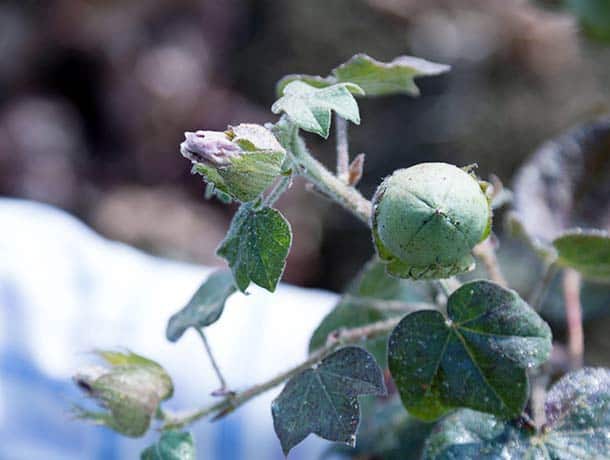
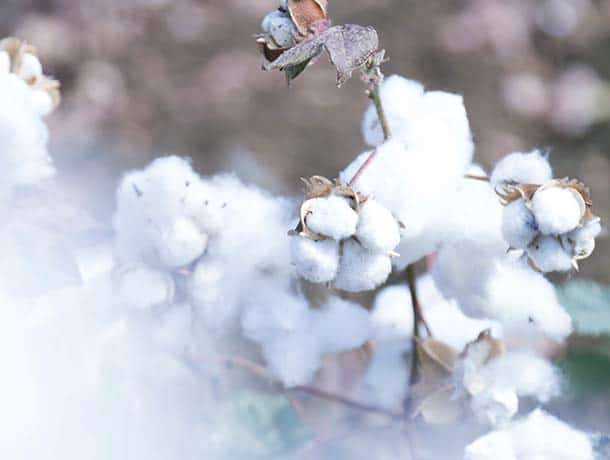
We are continuously striving to increase the share fabrics made from GOTS certified cotton yarn. Additionally, we are trying to connect suppliers of certified organic yarns and the smaller weaving mills we work with. Due to high required order quantities these weaving mills often have no access to fairly and ecologically produced yarn. Also our grown production in the last years makes it easier for our suppliers to source organic fibres and we are very happy about this success and thus the establishment of new fair supply chains.

From cotton to yarn │ From yarn to cloth │ From cloth to clothes │ From Chittapur to Berlin
Tradition on
the handloom
From yarn to cloth
But how is a seemingly endless ball of yarn turned into a piece of cloth? There are two ways: knitting or weaving and subsequently, there is knitted, as well as woven fabric. Knitted fabric is known for its chunky pattern and its elasticity, while woven fabric has a chequered pattern and is not elastic, unless it contains elastane. Since 2016, we have only worked with hand-woven fabrics that are 100% cotton, and therefore not elastic.
We know all our textile manufacturers personally. We met them on many journeys through India, drank countless teas with them, collected fabric samples and developed designs together. We could therefore convince ourselves not only of the fabric’s quality but also of the local working conditions. This way, we ensure that our money does not go to large corporations or middle men but straight to the weavers themselves.
At this point, we would like to introduce each of our textile manufacturers in more detail:
TRUETONE
TRUETONE has been our partner for many years and is without doubt a pioneer for sustainability in India. The company is GOTS-certified and only works with organic cotton. They have also made significant contributions to the further development of natural dyeing processes. They only use natural colours, made from marigolds, onions or pomegranates and the like. Subsequently, their dyes have no negative impact on the environment and our health. Some of the beautiful block print fabrics from earlier collections are produced by TRUETONE, using traditional techniques.
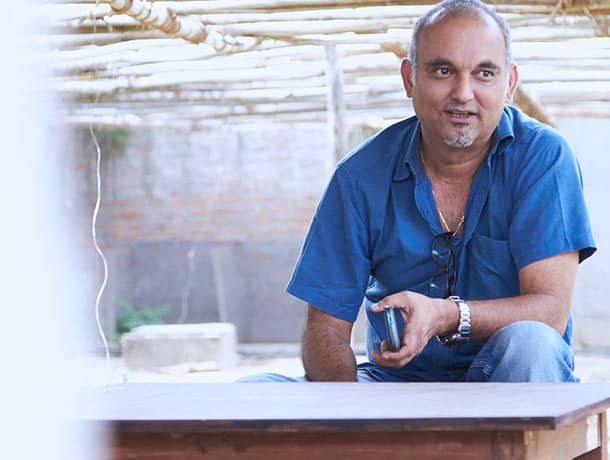

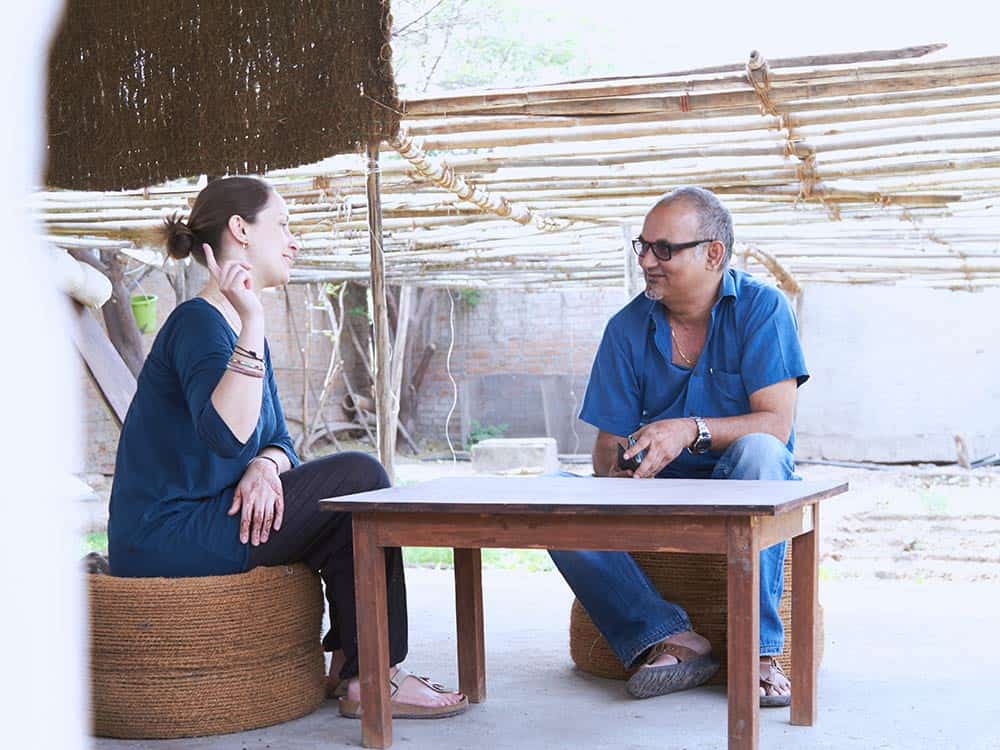
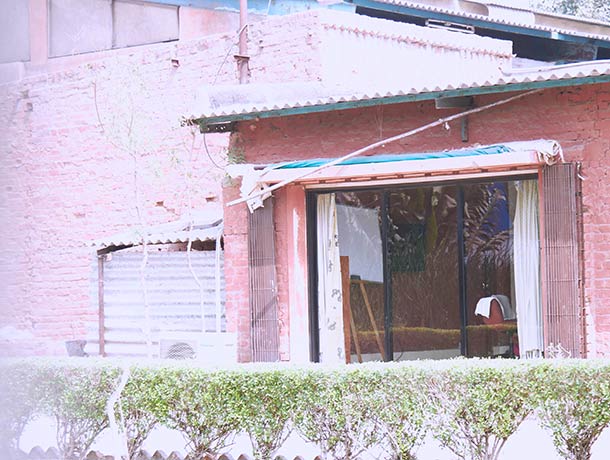
MORAL FIBRE
Similar to Dastar Andrah, MORAL FIBRE is a social enterprise, committed to ecological and social sustainability. Through its collaboration with different cooperatives, MORAL FIBRE aims to sustain small yarn producers’ livelihoods, which are threatened by poverty.
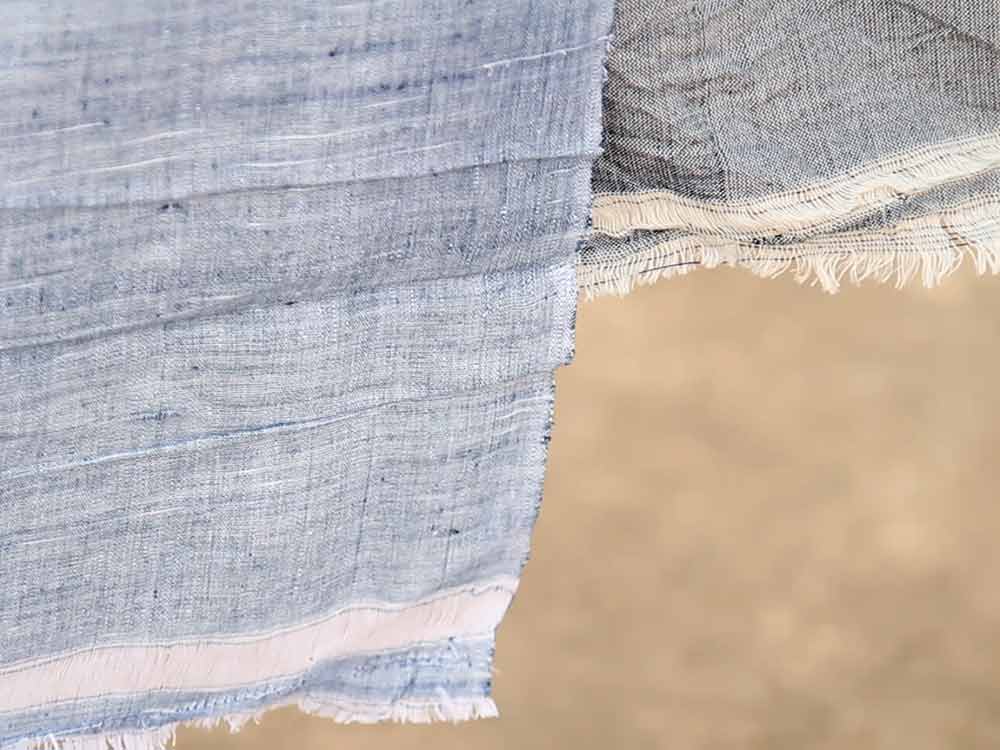
VANKAR KANTILAL SAMAT
In Sarli, which is located close to Bhuj within the region Kutch, we have been working together with KANTI and his family since 2015. Following a common custom in this area KANTI is part of a local cooperation of other weaving families from the village which allows them to produce fabrics together. We fell in love with their traditional way of working, the familiar setting and their gorgeous cloth. KANTI’s fabrics are made from ordinary cotton, but we are continuously working on enlargening our production so the high minimum order quantities for organic yarn can be reached. Originally, the weavers in Kutch tended to work much more with wool than with cotton. Every weaver was personally linked to a Rabari family who would supply yarn from sheep and goat wool. Nowadays, animal husbandry is still very common within the area and the whole wool is derived from locally reared sheep. We started using wool for our production in fall 2017 for the first time.
Vankar Kantilal Samat │ P.O. Sarli │ Ta. Bhuj – Kutch │ 370 485 Gujarat
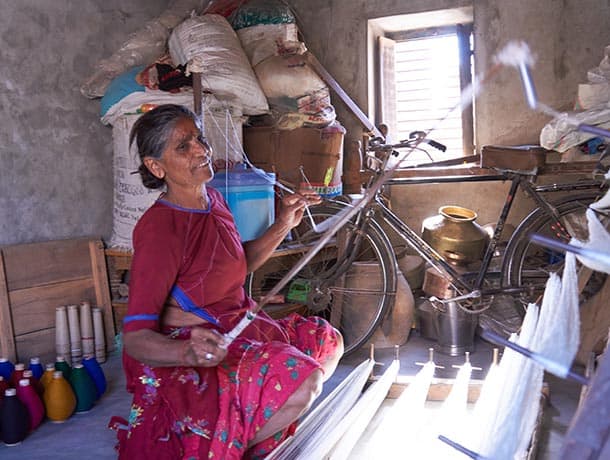
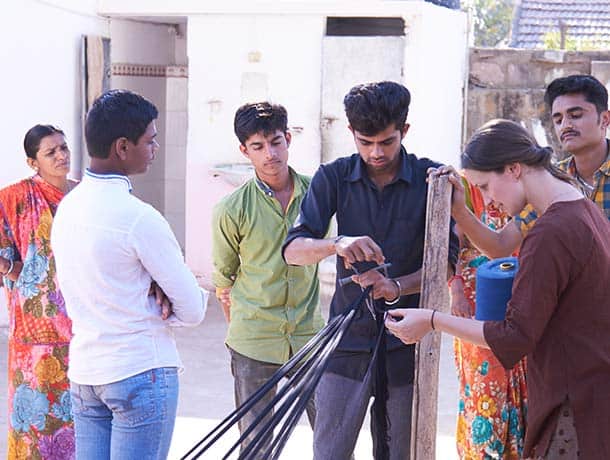
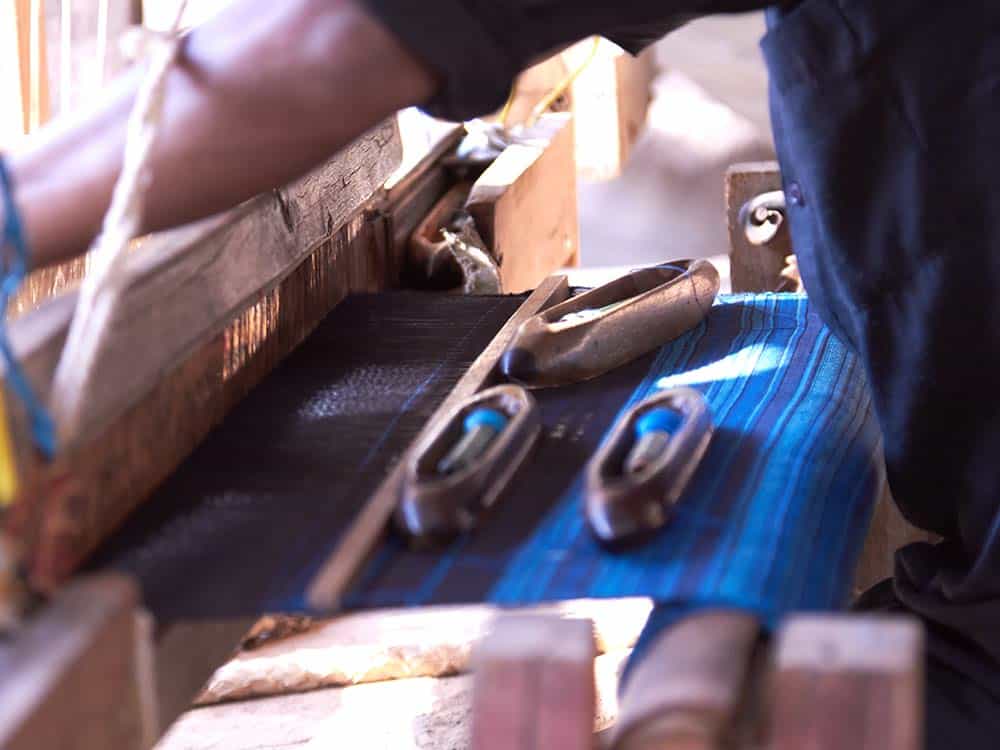
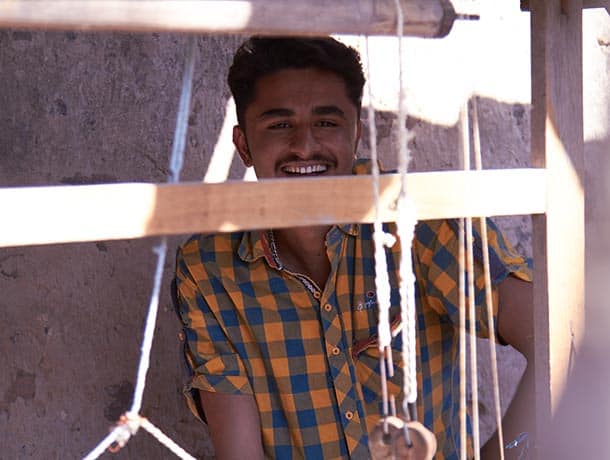

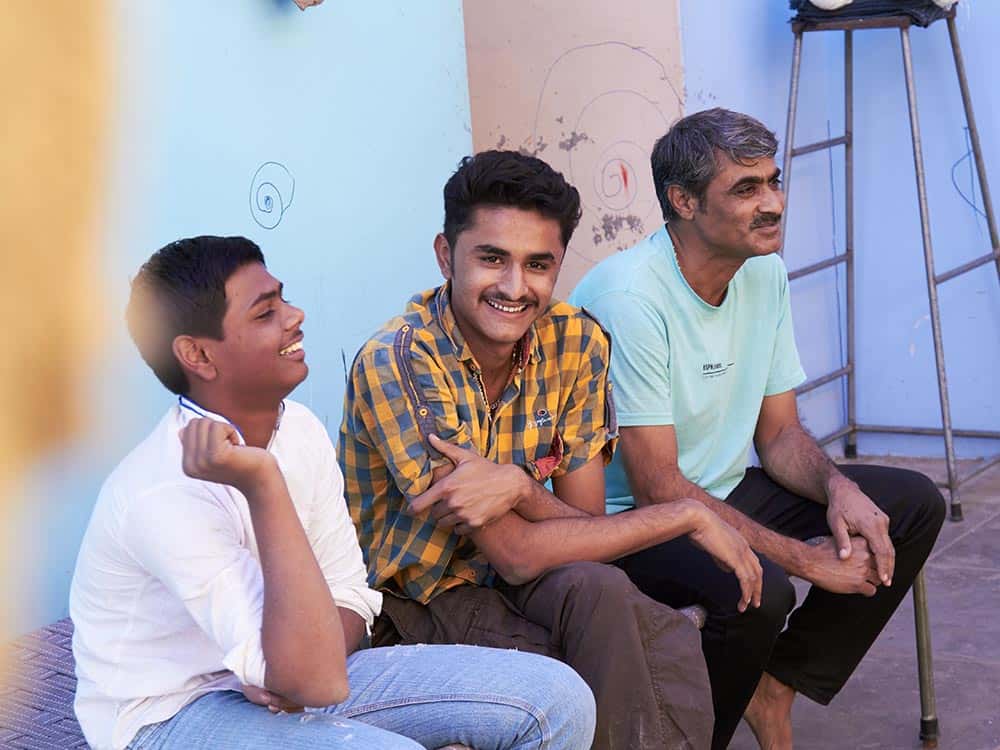
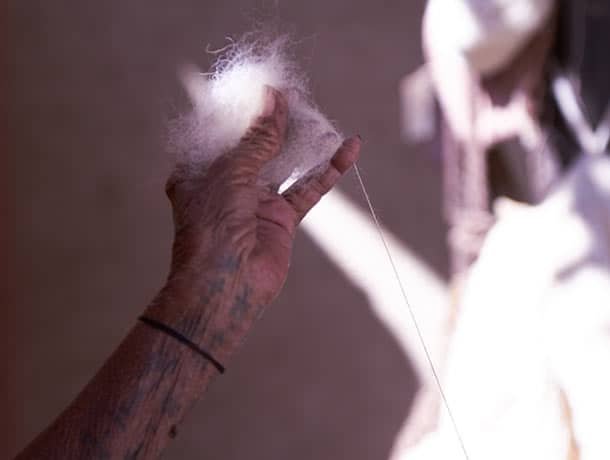
BAGRU TEXTILES
BAGRU TEXTILES is a block-print company based in Bagru, a small suburb of Jaipur in northern India. Walking through the residential quarter, one sees giant lengths of patterned fabrics hanging in the sun to dry on most the flat rooftops. Many Chhippa (printer) families, who traditionally dye and print fabrics, live here. First, using special iron tools, delicate patterns are cut into woodblocks. With these "blocks" – some the size of a finger, others as big as a plate – lengths of fabric are printed with impressive precision and without any gaps. BAGRU TEXTILES work together with many of the inhabitants of this area, who largely conduct their work from their homes. The business attaches a lot of importance to fair wages and invests part of its profits in community health and education programs.
Chhipon Ka Mohalla │ Laxminarayan Krishi Farm │ Bagru │ 303007 Rajasthan
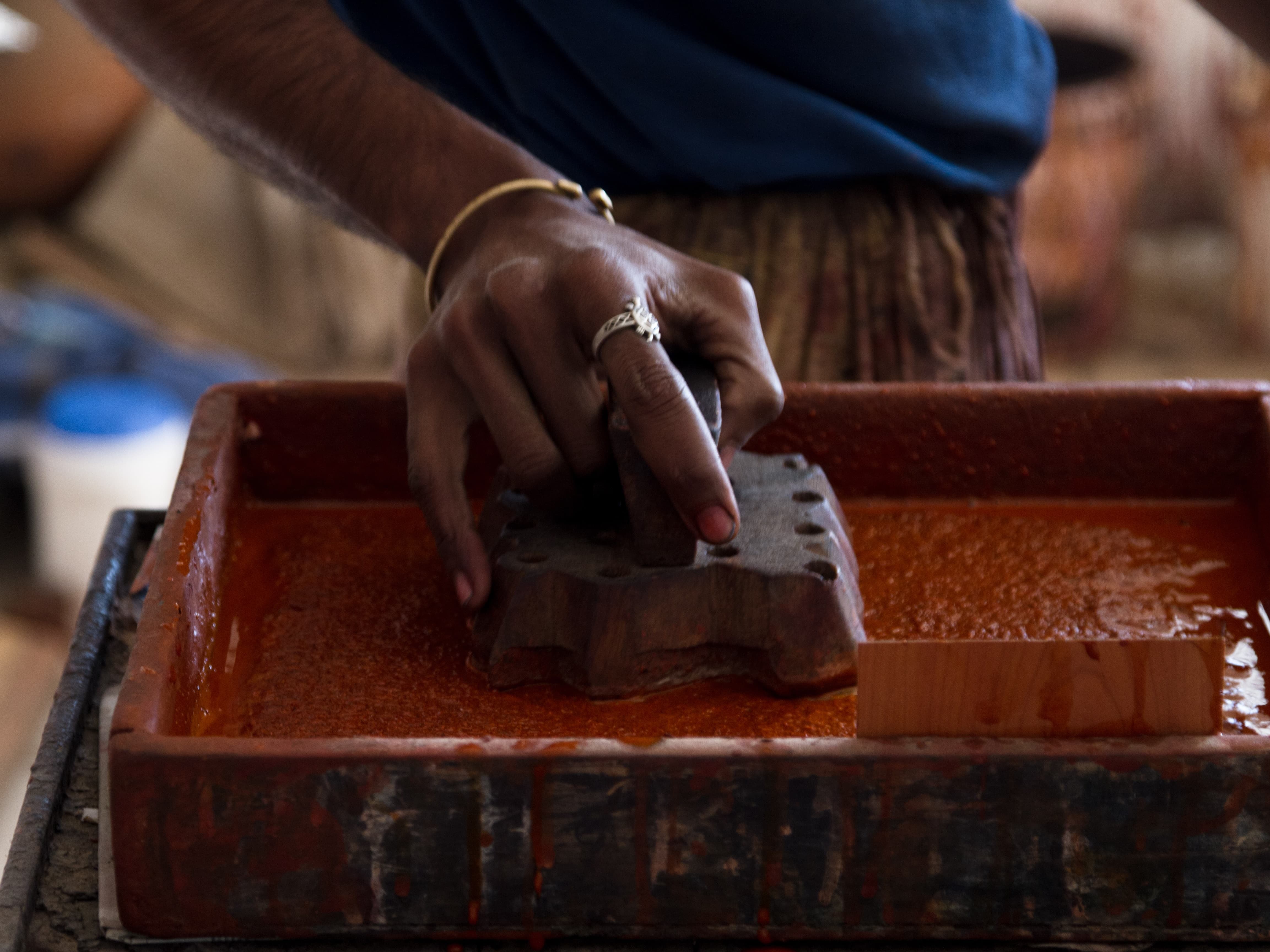
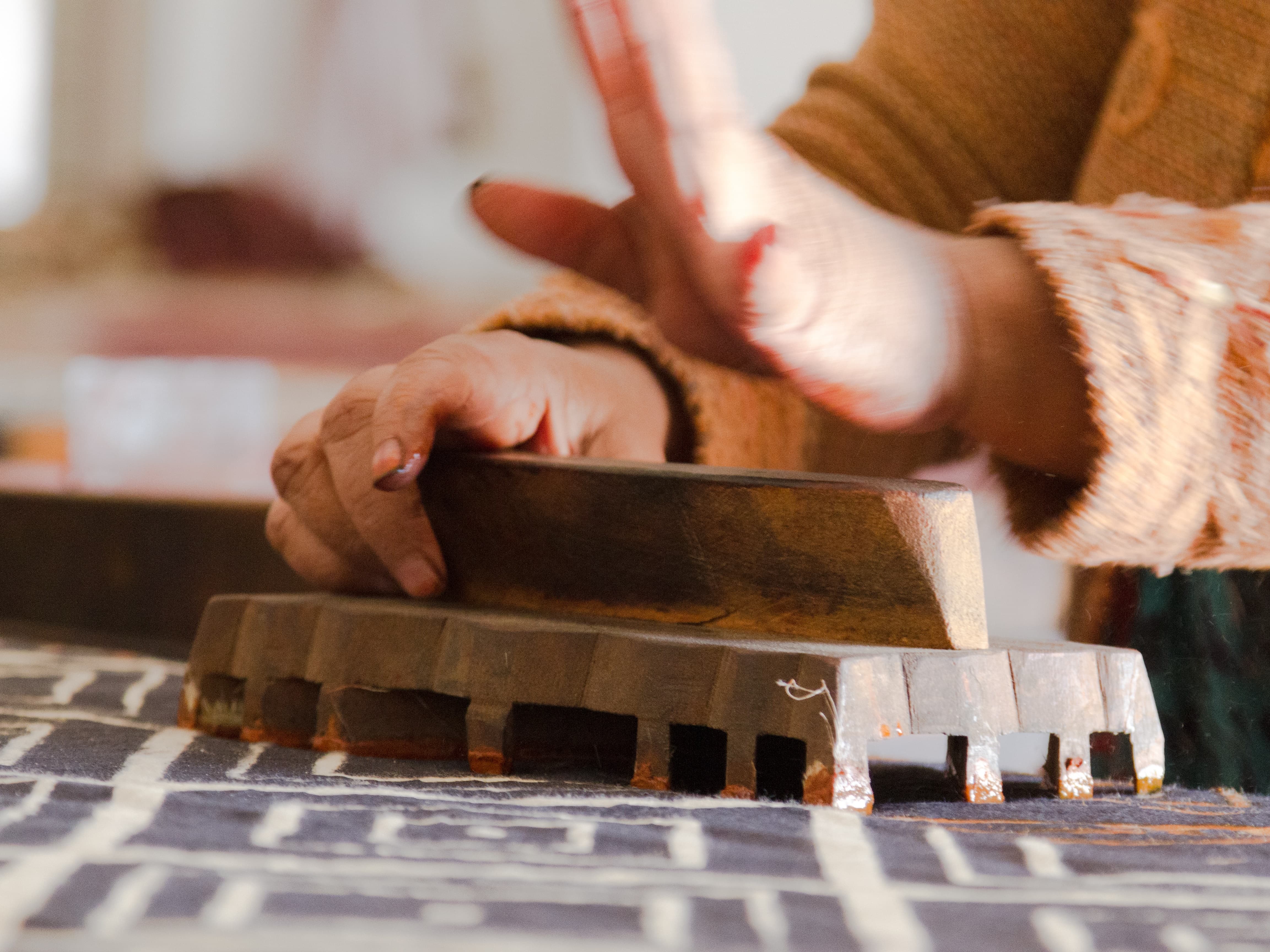
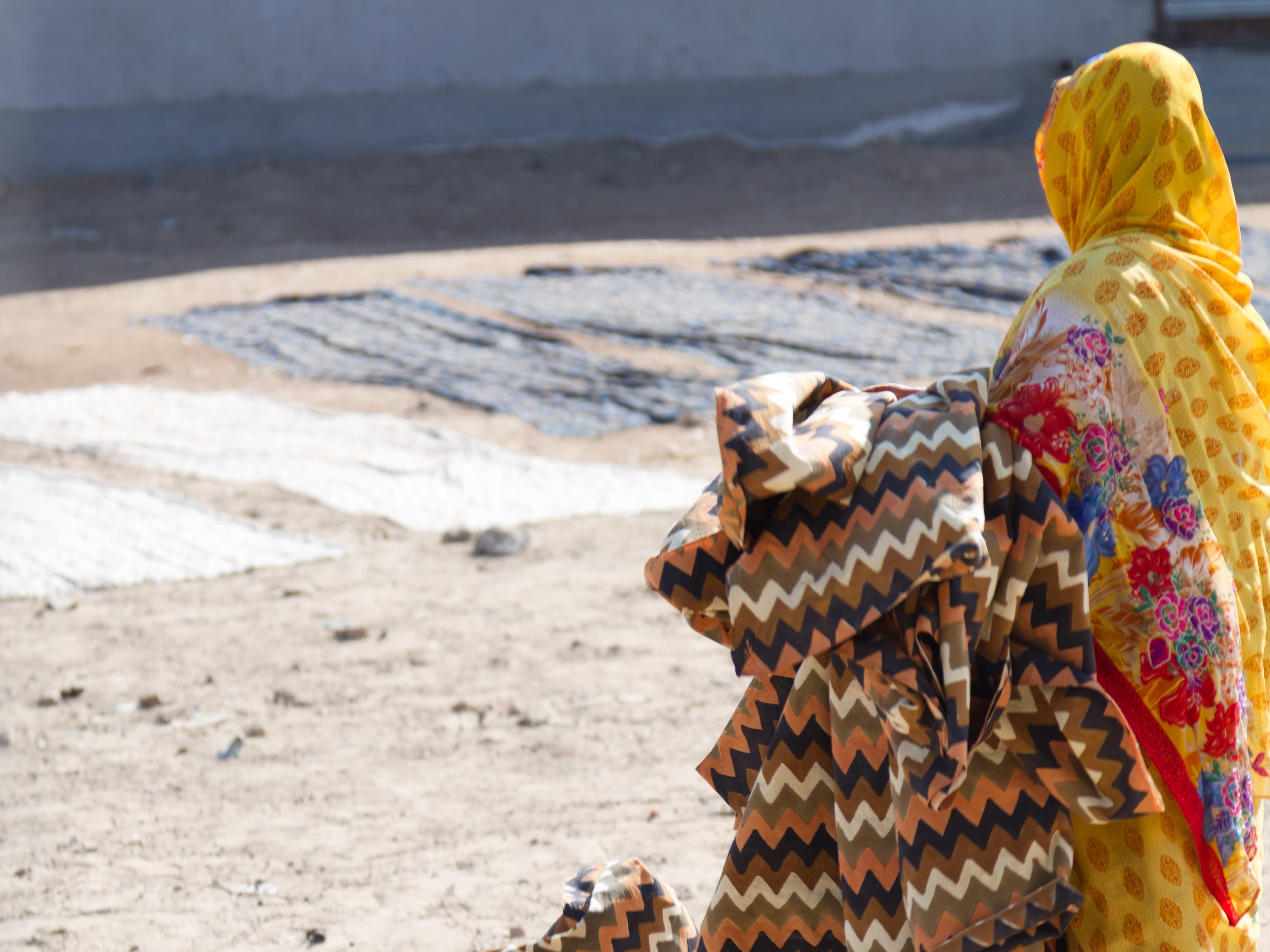

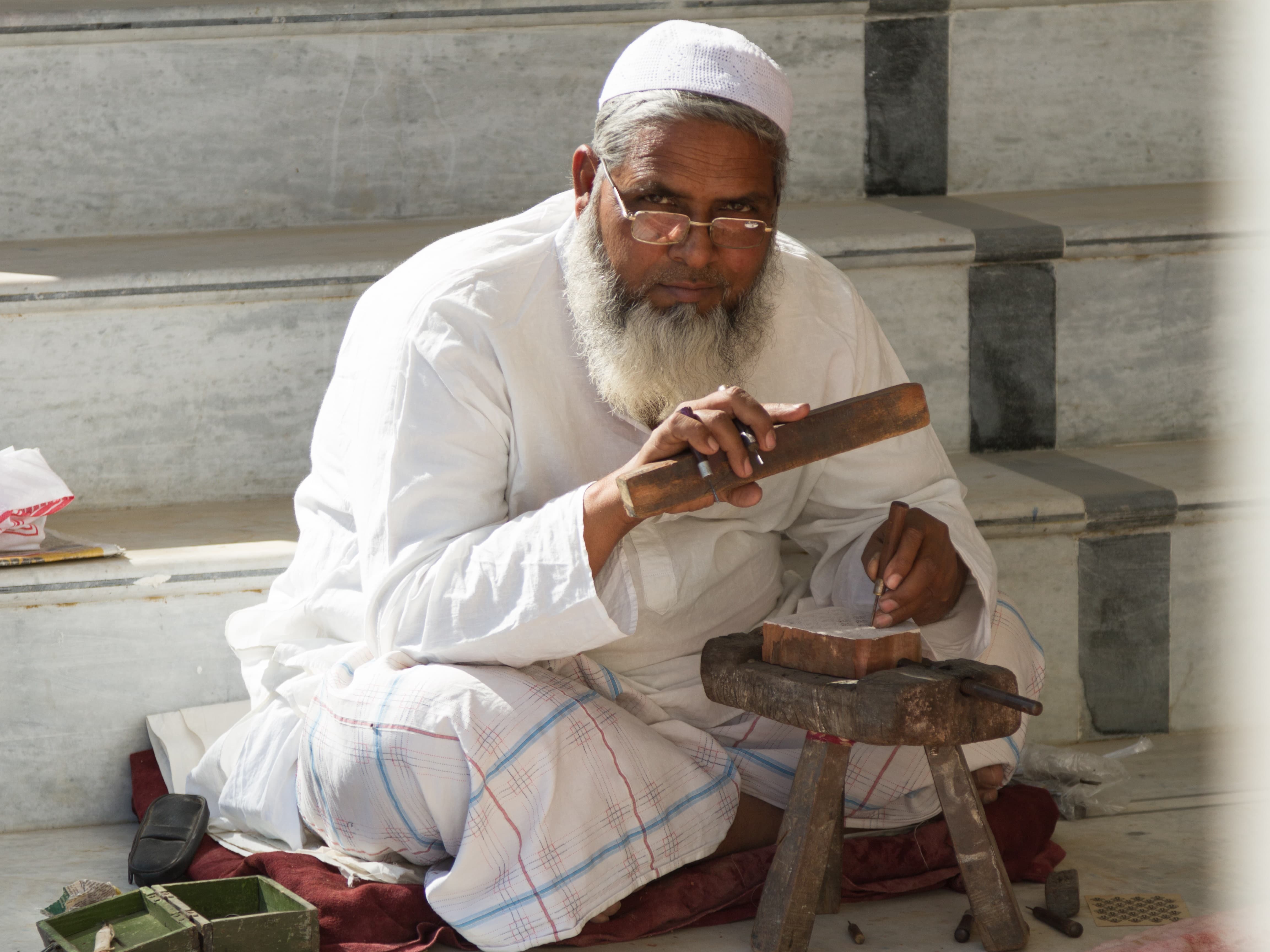
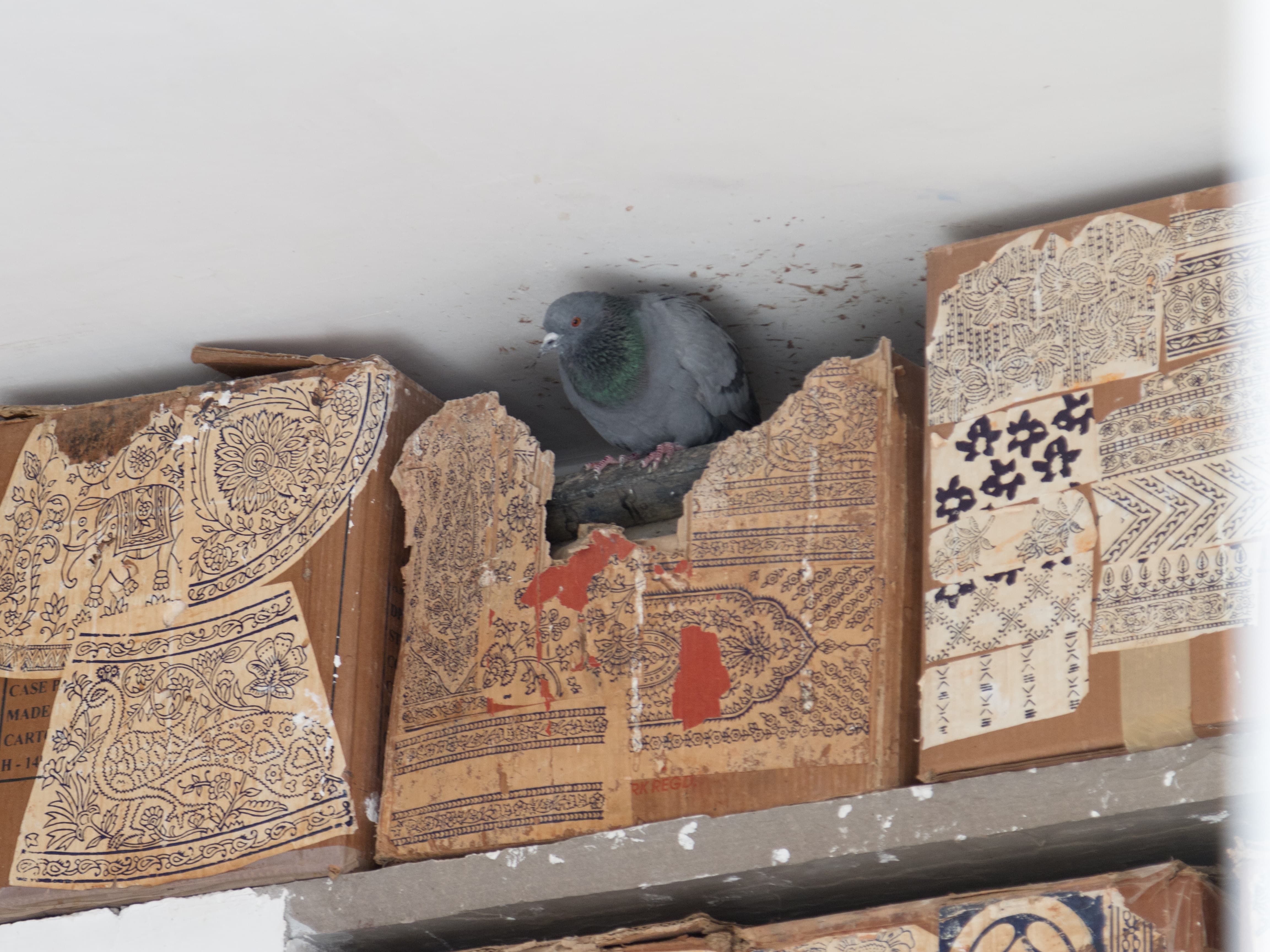
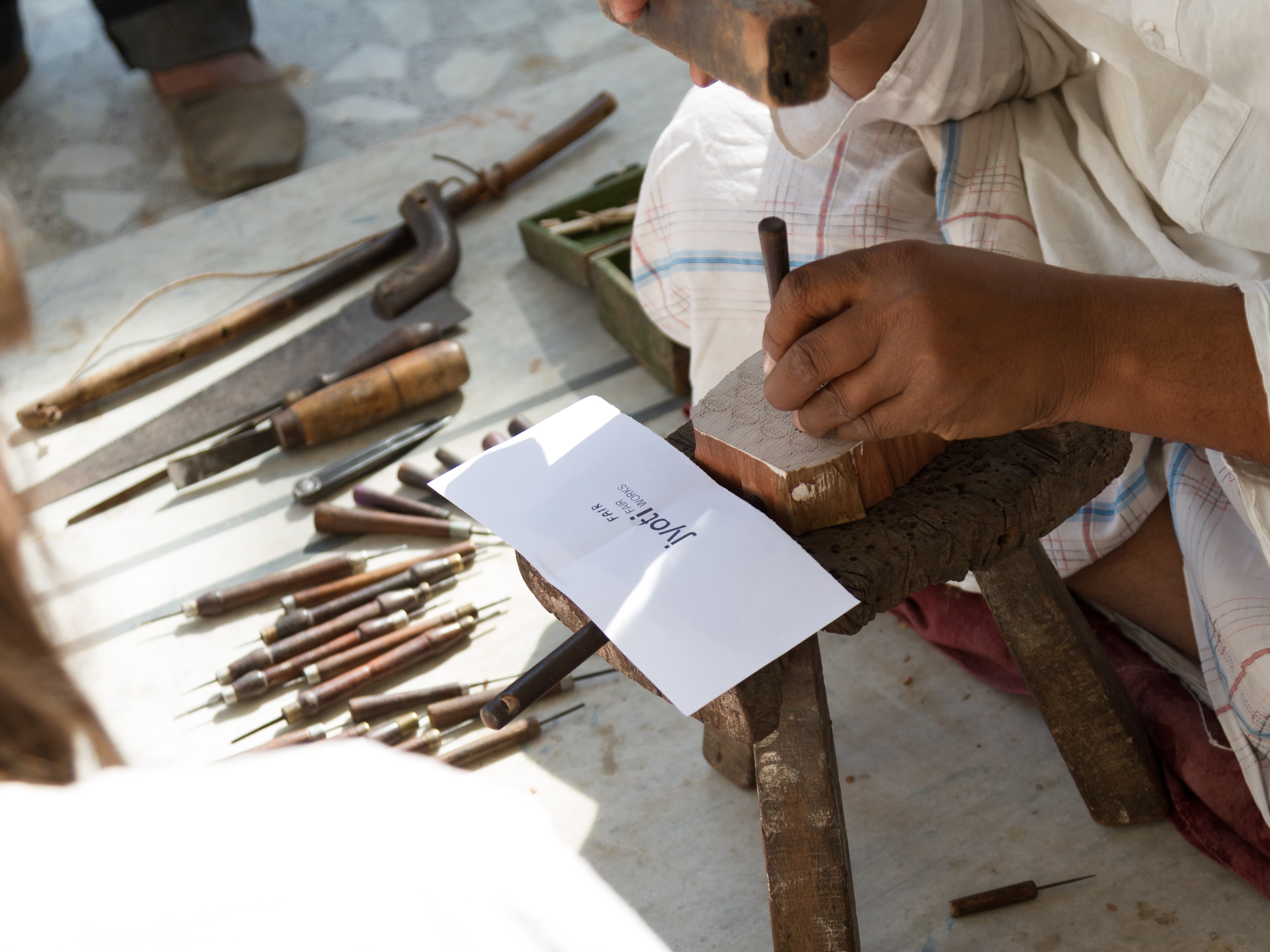
7WEAVES
We are working with 7 WEAVES since summer 2017. From them we purchase fabrics which are made from so-called peace-silk. What is special about this silk, is that it is produced without harming the lives and habitat of the silkworms. Unlike in conventional productions, for which the pupae in their cocoons are boiled in water and killed, the moth is leaving its “home” naturally, before the cocoons are further processed. The non-violent silk production has a long tradition in the villages around Guwahati (Assam). There the cocoons are degummed in a natural lye, made from the wood of the banana tree, and afterwards spun by hand to a silk yarn. Subsequently hundreds of meters of yarn are dyed with natural materials, such as the leaves of the Mehndi bush, pomegranate or turmeric and afterwards woven to meters of fabric at handlooms, which almost every villager has at home. Due to the special kind of silk “Eri” and as everything in the process is handcrafted the fabrics have a very special structure which is quite unusual for the silk we know. Nevertheless, the fabric keeps its promises. Due to its thermal properties - it keeps you warm in winters and cool in summers – it is perfectly well suited for all kinds of clothes.
7WEAVES SOCIAL │ 6 Dr.B.K.Kakoty Road │ Ulubari │ Guwahati │ Assam
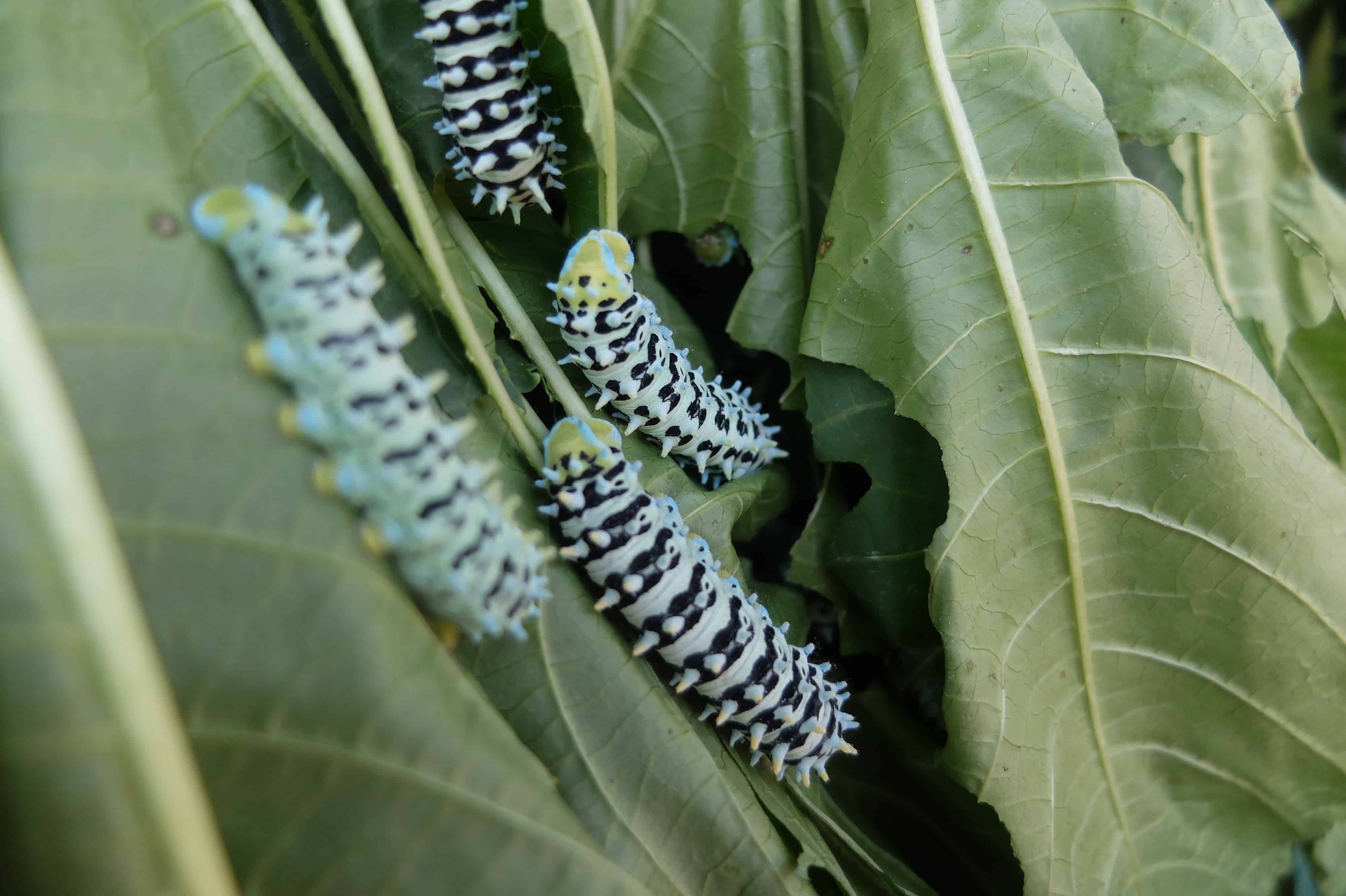

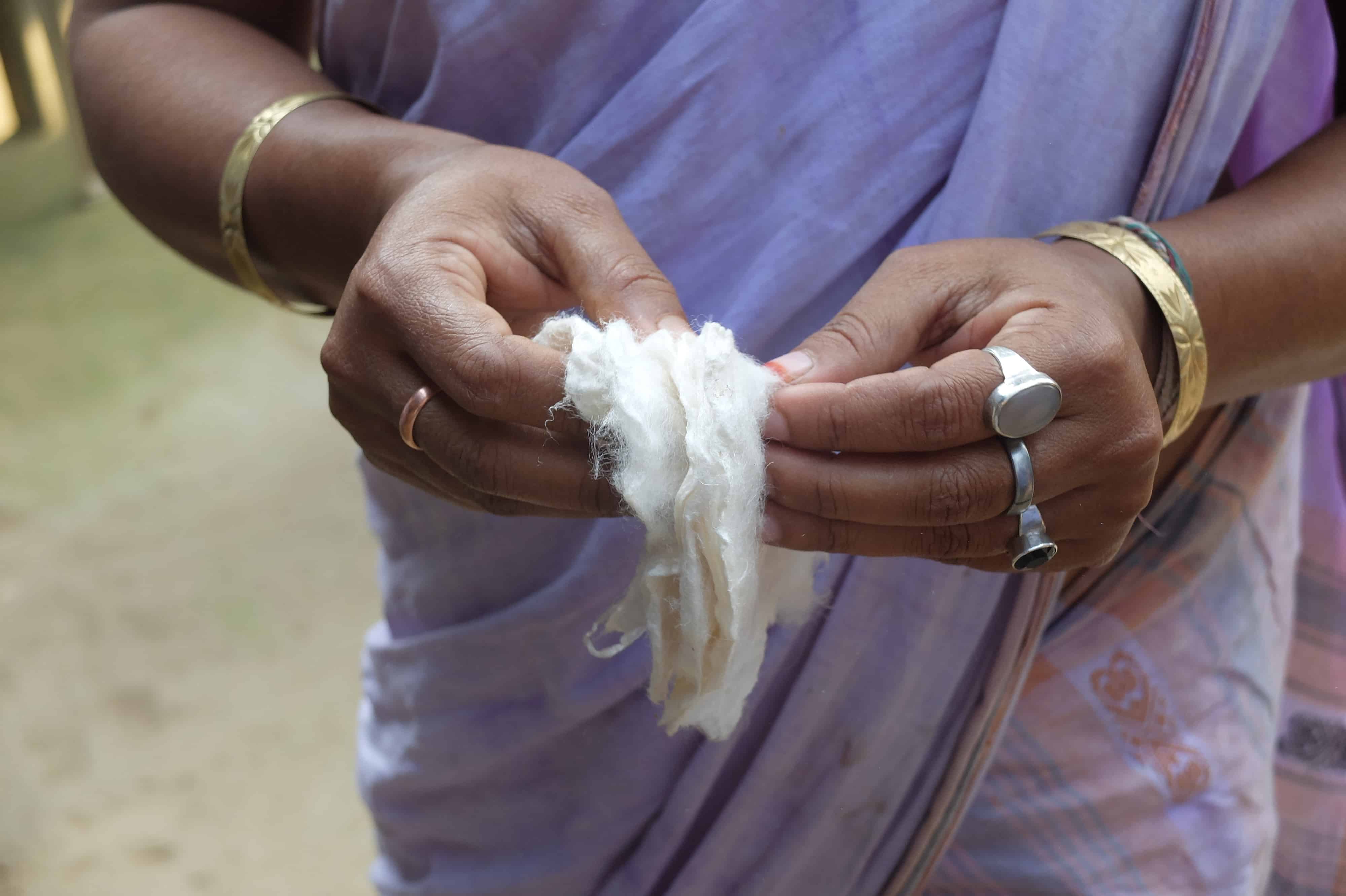
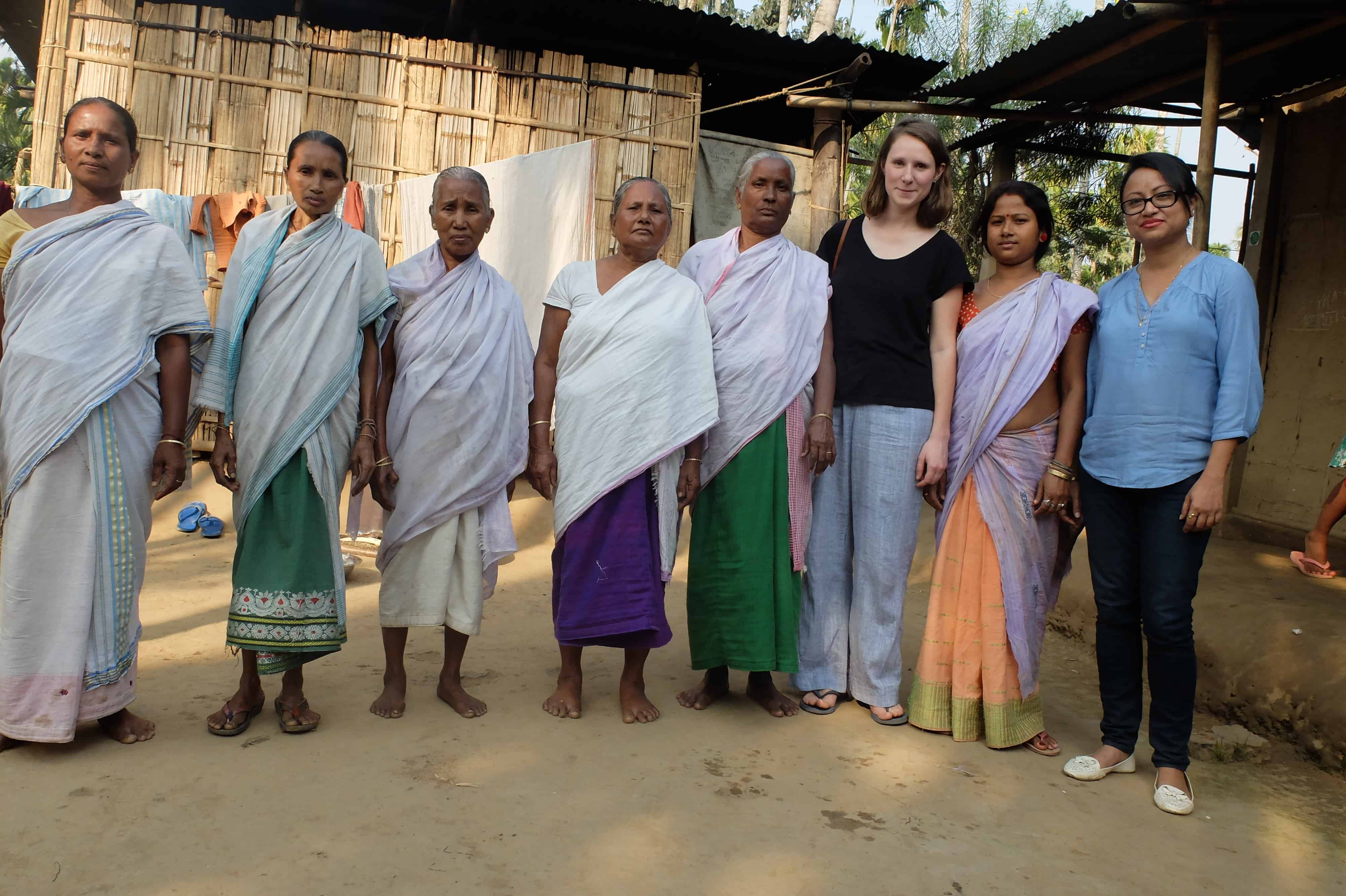
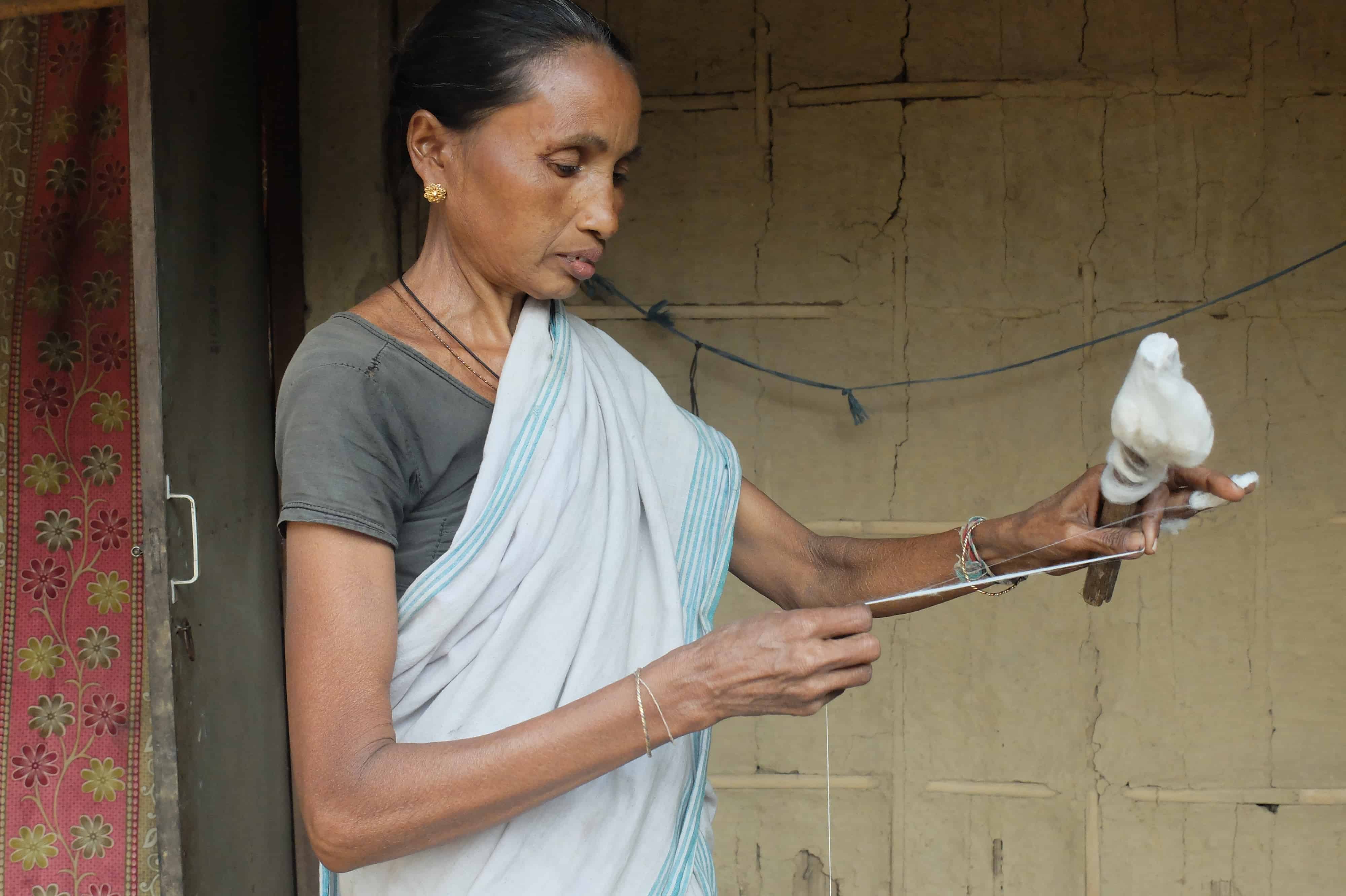

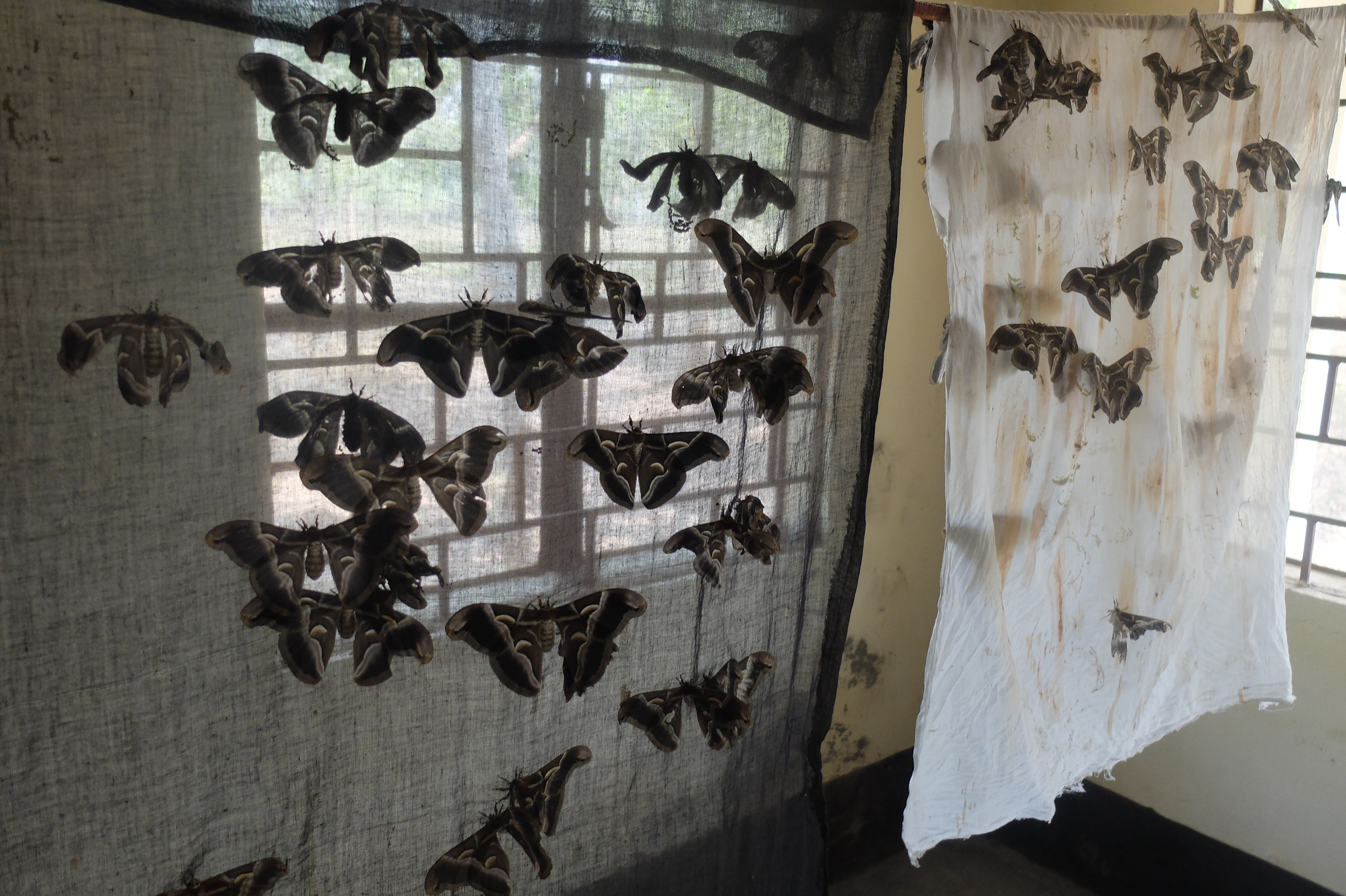
TRANSLATE
is a small Indian fashion label based in Hyderabad, which champions local Ikat artisans. Translate’s mission is to revive this traditional craft, in order to create more awareness for this beautiful weaving technique. What makes Ikat weaving special is that the yarn is dyed in sections before weaving takes place. Generally, the bundled yarn is tightly tied in sections before being submerged in dye. Later during the weaving process geometric patterns appear due to the alignment of the dyed sections across the entire fabric. The appearance of these patterns reveals the depth of skill and mathematics behind the technique. Ikat fabrics are produced around the world, known by various names such as ‘Kasuri’ in Japan, used for fine Kimonos, while the technique can also be found across Africa and Latin America. Translate was founded in 2010 by Vinita and Vika Passary, and both founders also produce their own clothing and accessories. We happened across them by pure chance, but were so taken with their beautifully soft patterned fabrics, that the weaving team of Translate are now producing fabrics for us too. The company invests enormous amounts of energy into textile design and constantly creates new and exciting weaves, which can be found gracing our online shop with their presence.
Store Anonym │ Road No. 92 │ Jubilee Hills │ Hyderabad │ Telangana
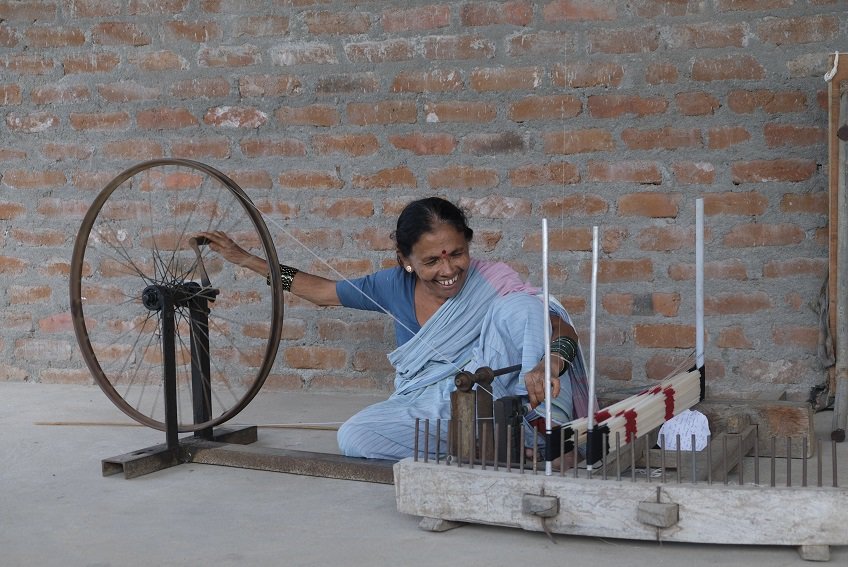
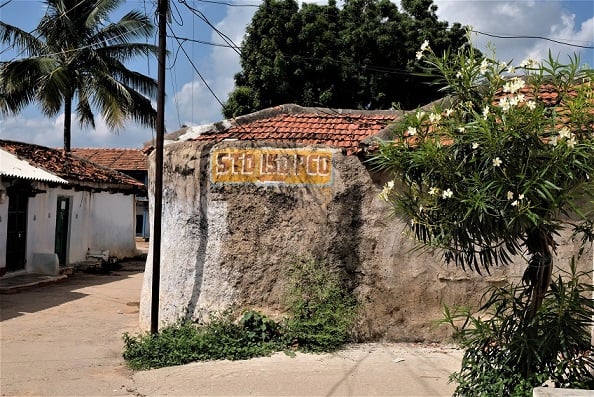
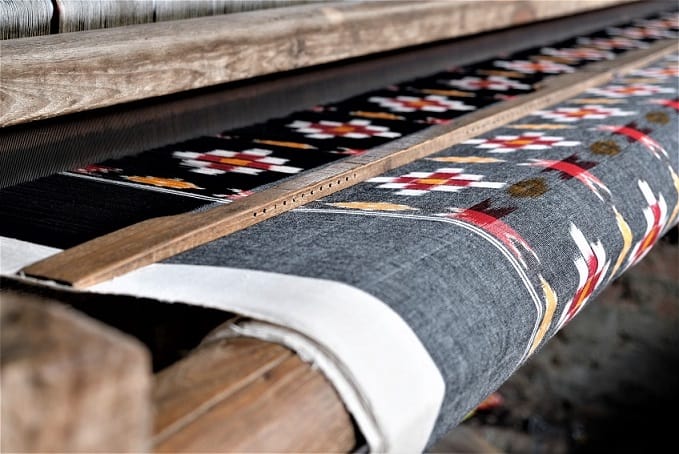
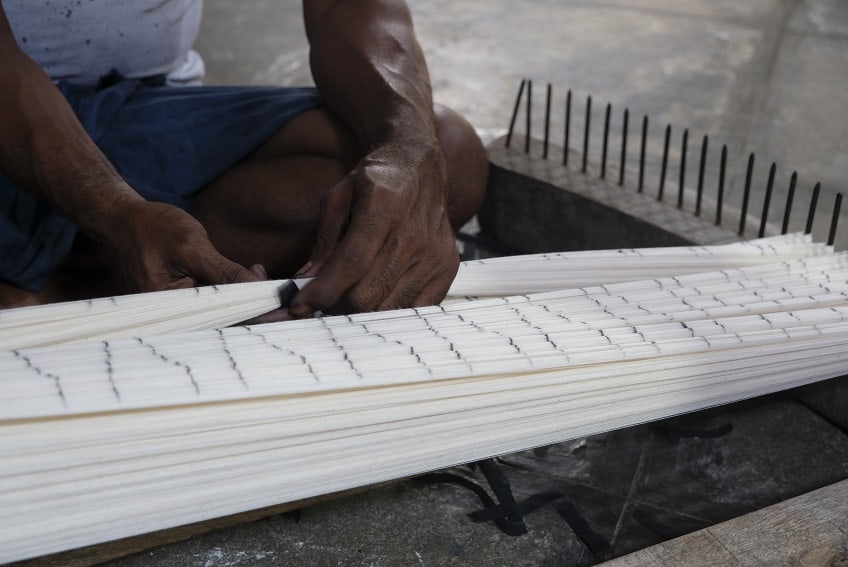
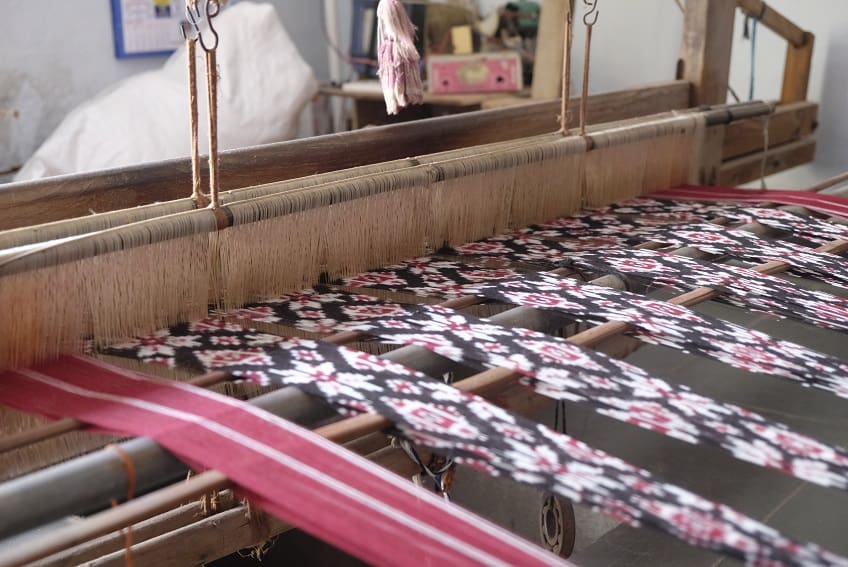
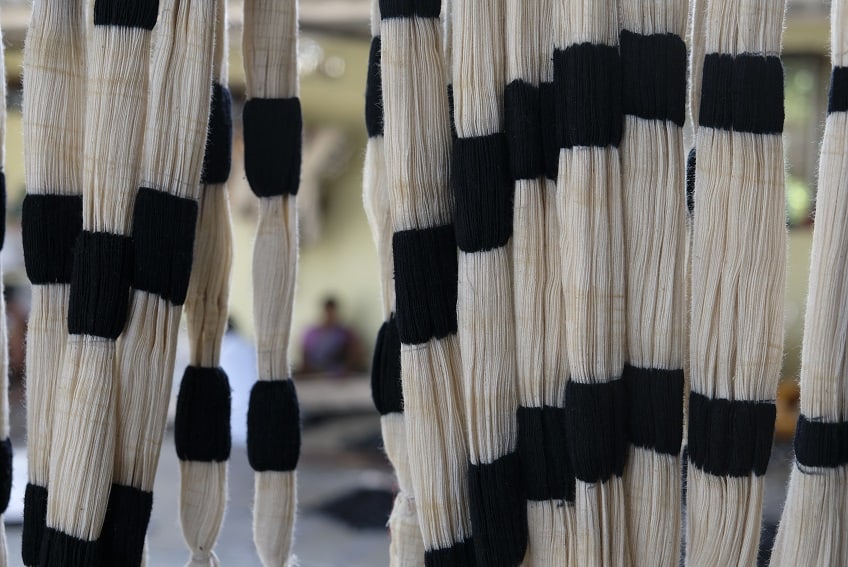
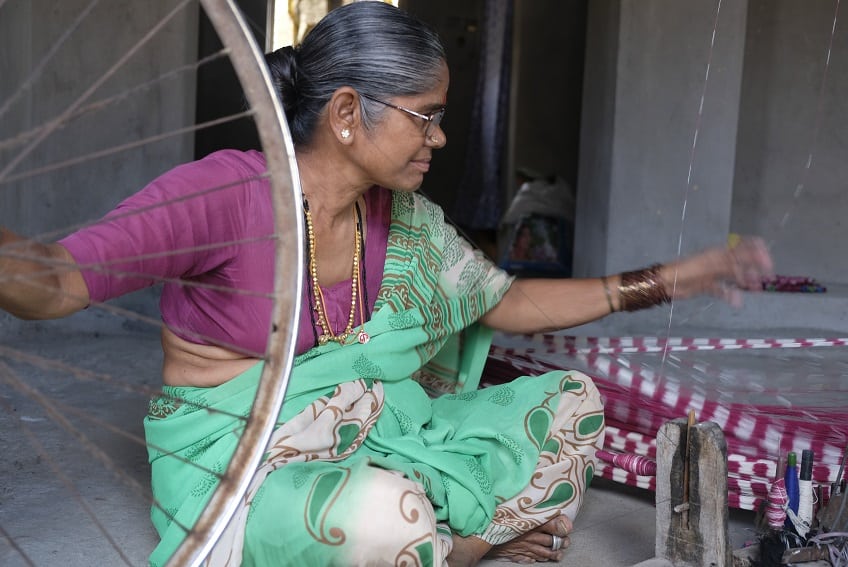
HERBAL FAB
HERBAL FAB was founded by the two brothers Prashant and Kunal and is located in the city of Ahmedabad (Gujarat, India). Combining their deep desire to create change towards a more sustainable world and their educational background, they founded the GOTS certified business Herbal Fab producing unique organic cotton, modal and tencel fabrics. Providing not only huge but also small amounts of fabrics to brands, their aim is to support and empower small start-ups and social businesses as ours and hence, help them grow and create long term change in the fashion industry. Next to their high standards regarding the social and environmental aspects of their production, they further initiated several social programs featuring different kinds of educational and health related projects in the region of their production as well as new approaches to recycling and reusing water.
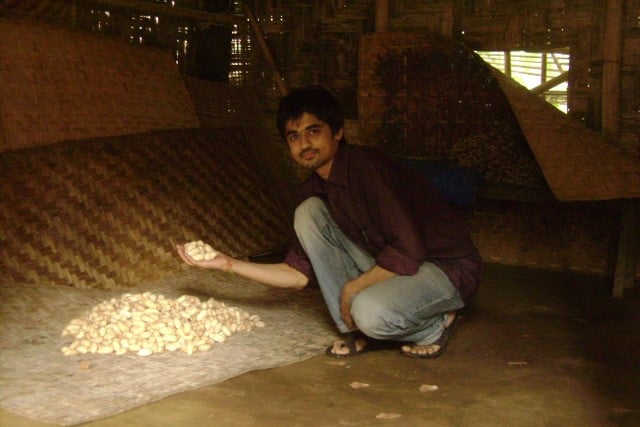

KHALOOM
KHALOOM is a wonderful brand, located in Bangalore, that is specialised in the production of handwoven fabrics from recycled yarns. Collaborating and empowering local weavers they follow a zero-emission approach. Founder Nanditha Sulur says: “We at Khaloom honour traditional craftsmen/women. Their unique skills are celebrated and preserved by providing work opportunities relevant in today’s age. We work with the deepest sense of respect for the artisans by celebrating their culture and for the environment by the recycled materials they work with. Perfect Imperfection is the key to KHALOOM’s aesthetics. The fabrics being hand woven possess a unique look that remind us of the beauty found in nature. The hand-woven fabrics are made from recycled yarns that let us connect ancient traditions with today’s need for sustainability and circularity.”
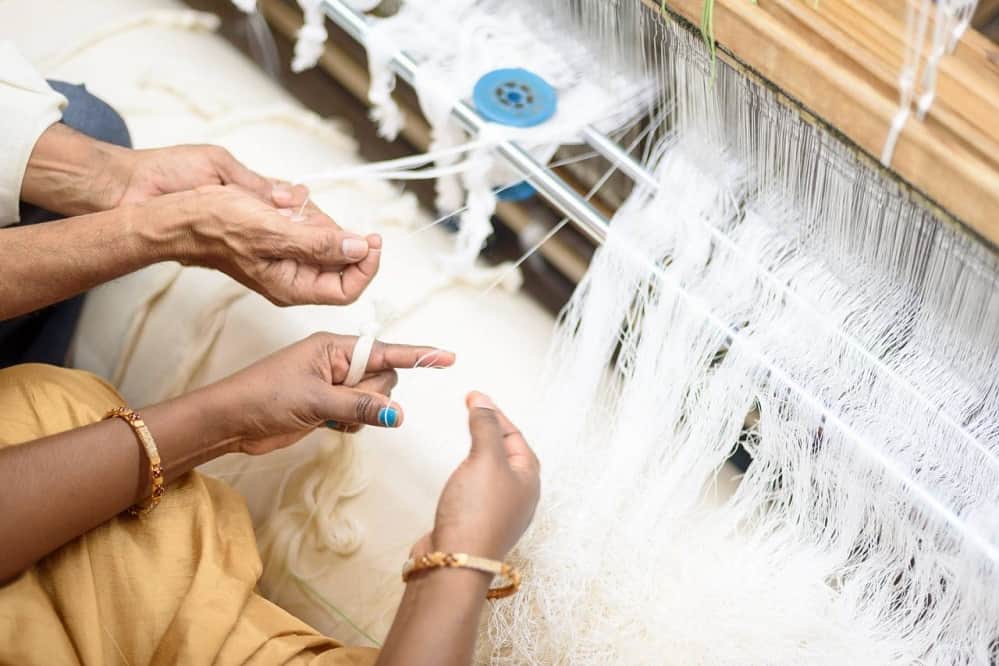
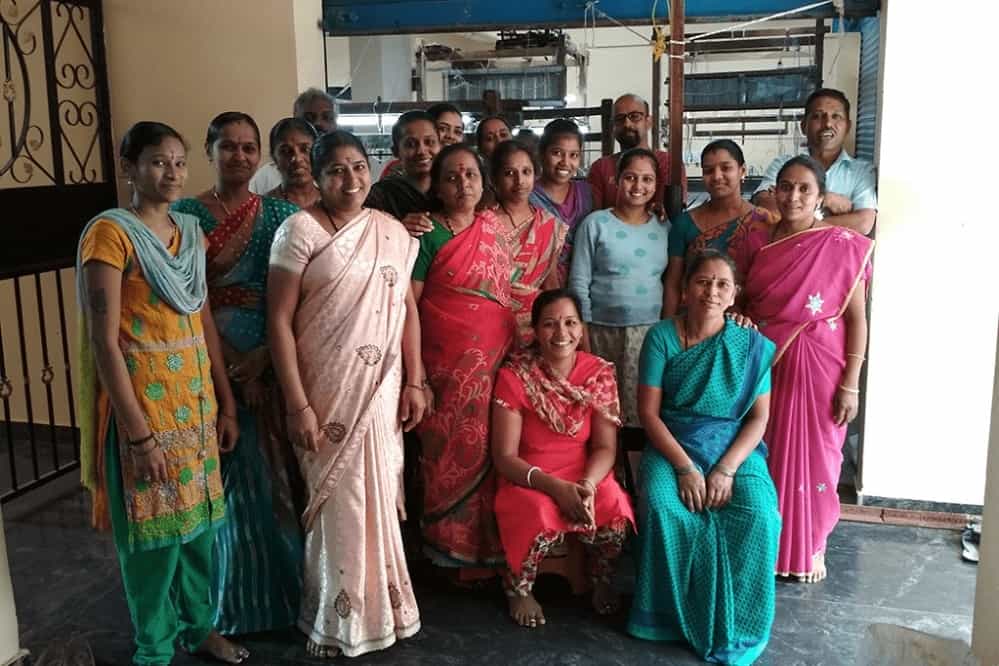
SYMPHONY
Situated in the outskirts of Ahmedabad (Gujarat, India) SYMPHONY is a multiple certified (GOTS among others) producer that adopted eco-friendly practices in the textile production through optimal use and conservation of all resources. Their intrinsic motivation is to ensure the implementation of environmental management practices through air, water, land management and green belt development programs. They are by far our biggest and most professional partner, which allows them to invest in innovative ways of production and offer a big range of sustainable fabrics. Symphony is specialized in Corduroy and Hemp Fabrics - the latter one being convinced of the sustainability advantages of hemp fibers, which are e.g. consuming 10 times less water than conventional cotton to grow. Symphony also is aware of its social responsibility as a big employer and offers its employees not only a payment well above minimum wage, but also free education and medical aid for their children and families.

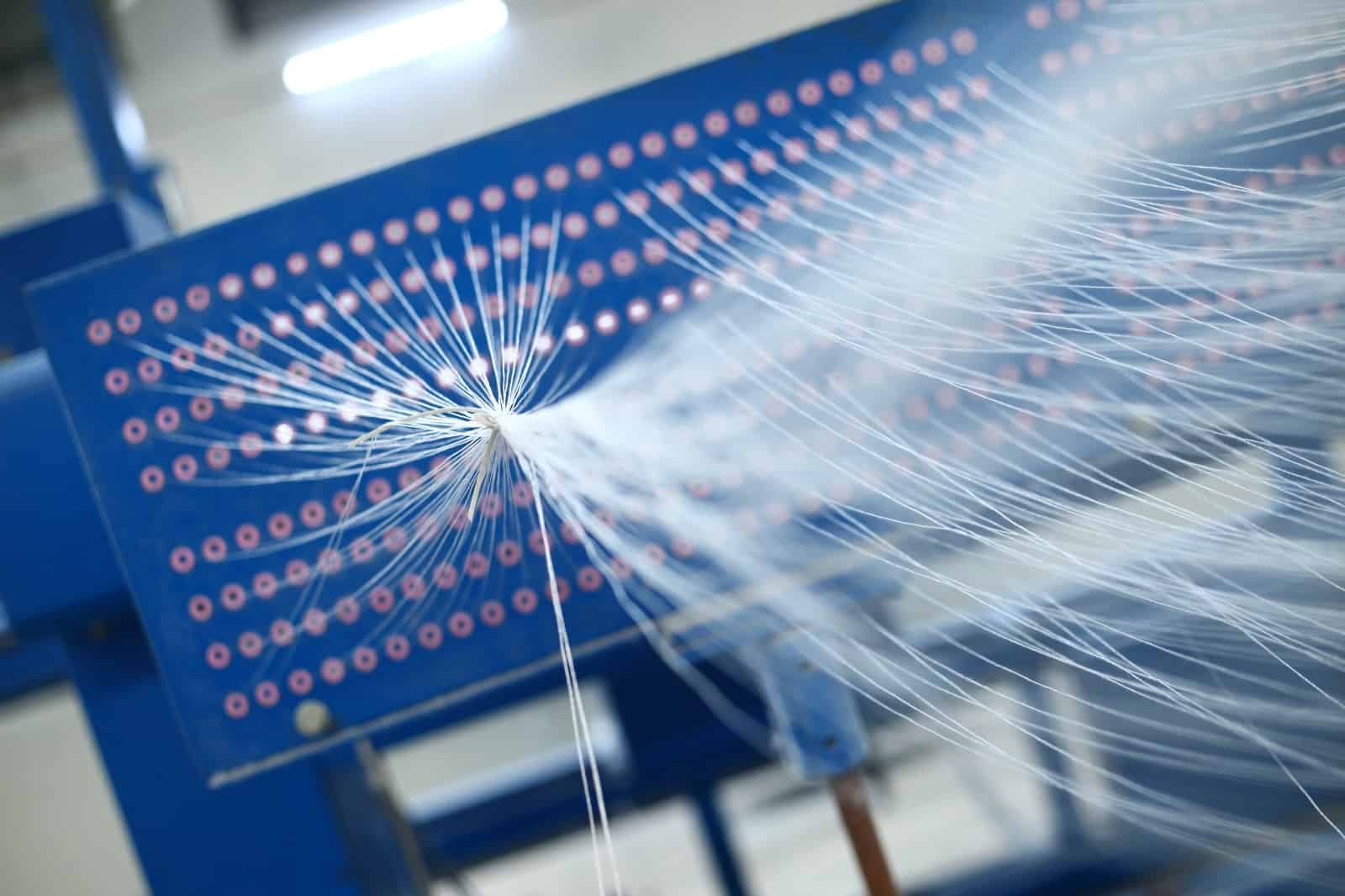
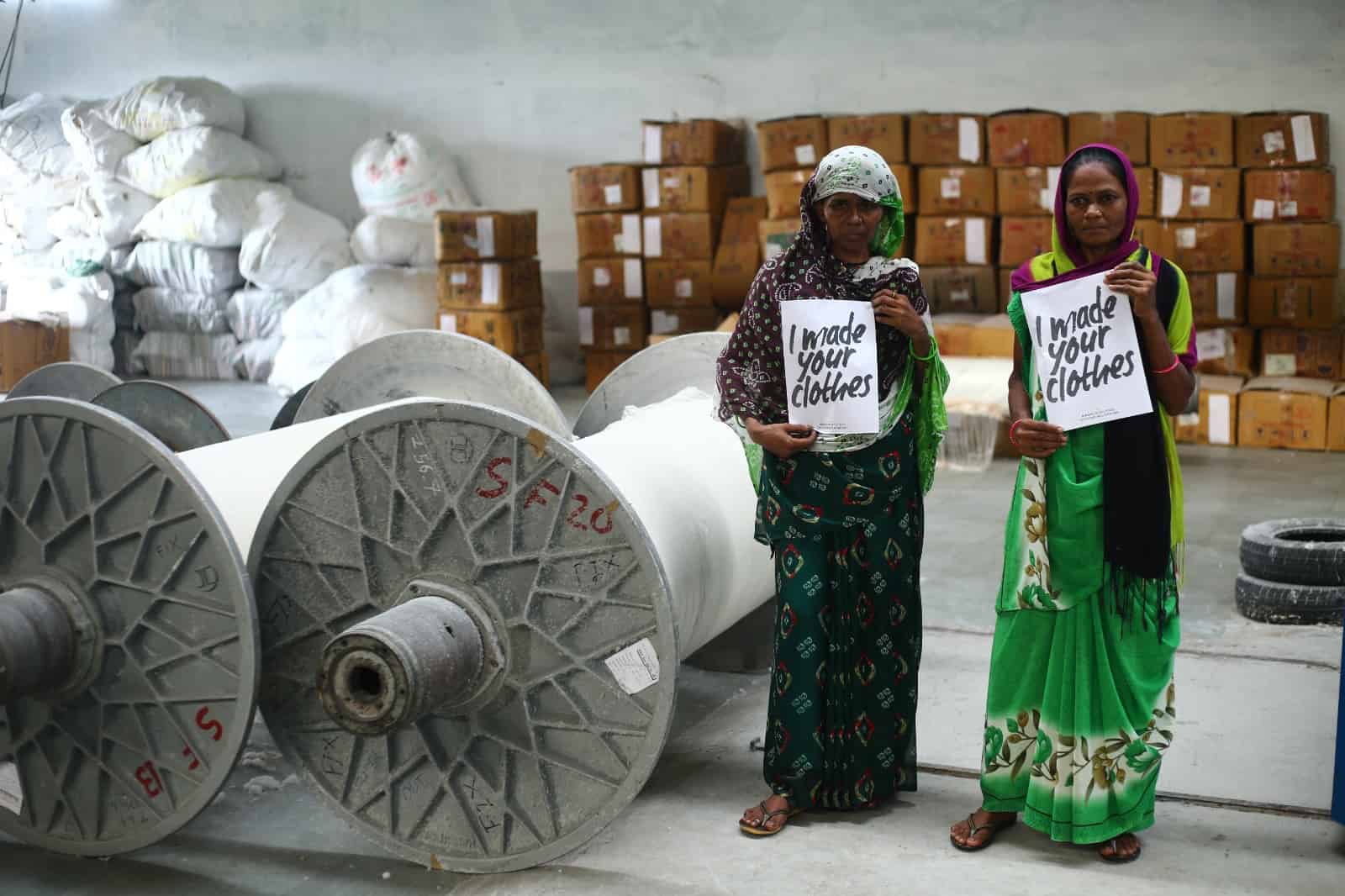
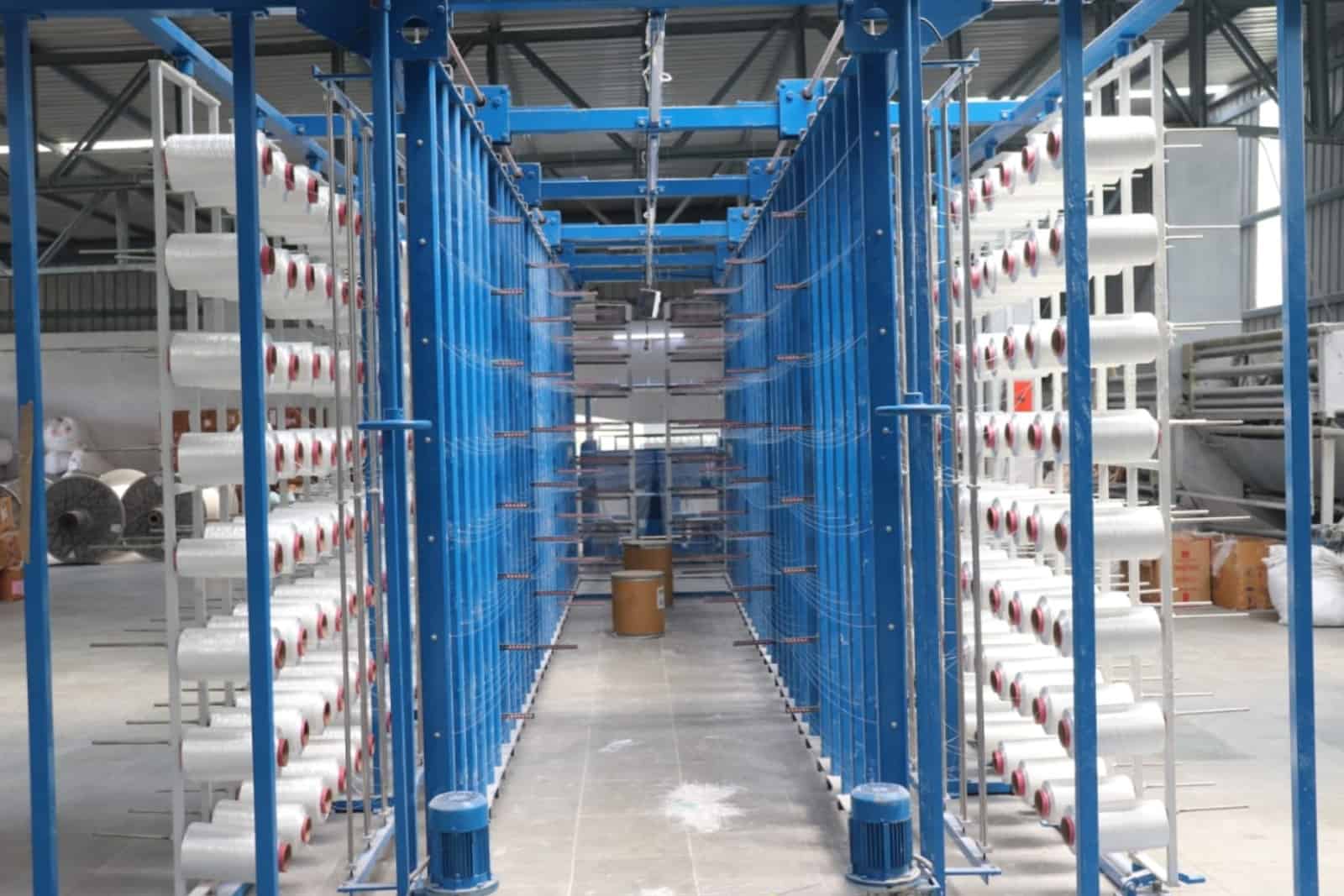
SEDHANTIK
Sedhantik is a brand situated in Punjab founded by the Indian designer Sidhant Minocha. Sidhant’s vision is to provide sustainable textiles and thereby support local communities as well as the environment in contrast to the common consequences of the fast fashion industry. Next to his personal efforts in the form of training Sidanth is giving to rural artisans to bridge between rural craftsmanship and national and international design demands, his brand Sedhantik is offering primarily home decor products but also printed and embroidered fabrics. Searching for a company which could provide us with block- or screen printed fabrics for quite a while, we finally discovered the beautiful products of Sedhantik. We are starting this new partnership with a very exciting collab collection with Monika Morito’s Designs, which Sidanth as a designer himself helped us to realize.
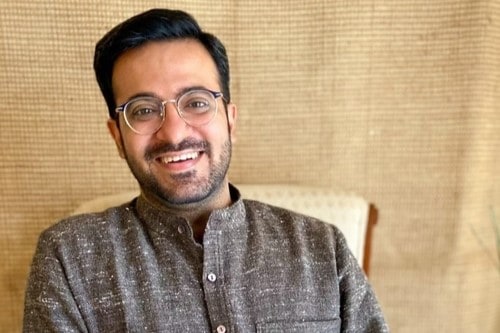
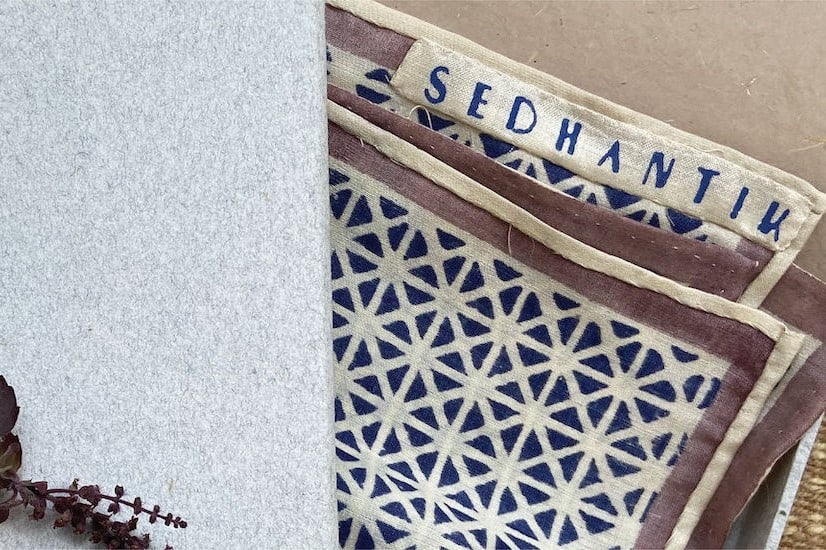
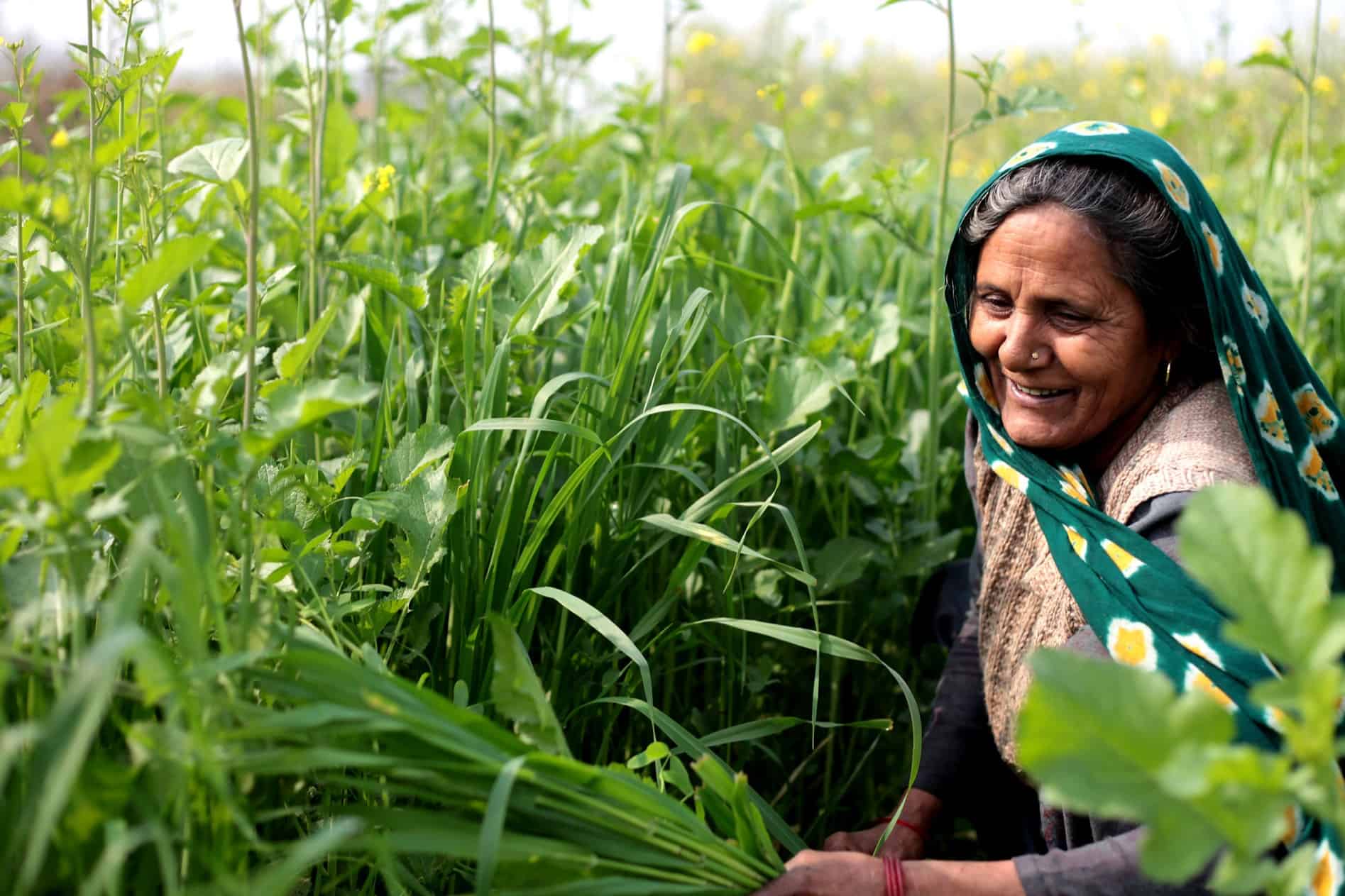
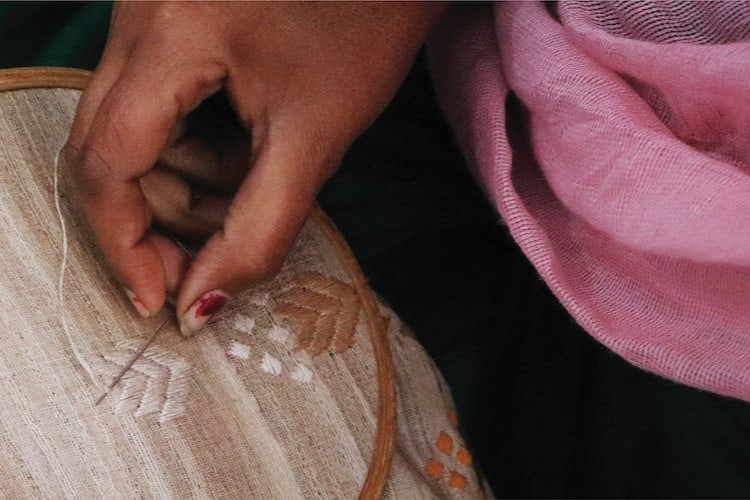
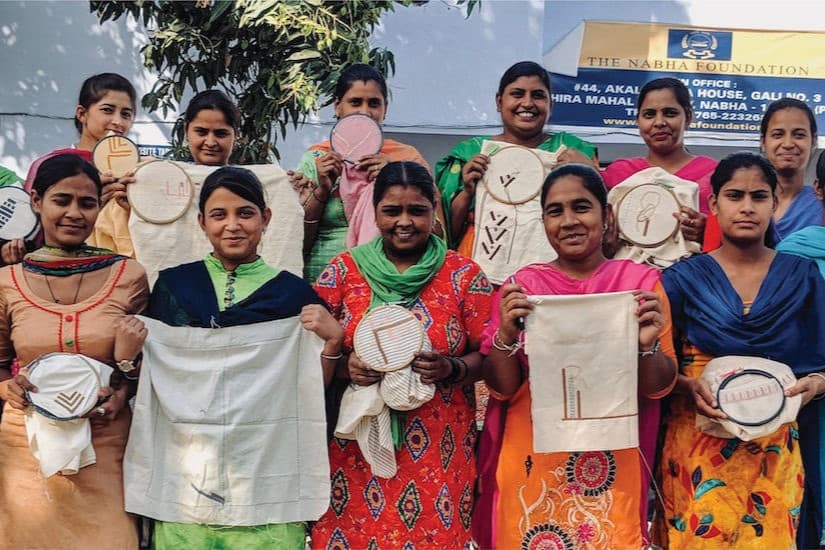
GOCOOP
GoCoop is actually an online marketing platform for artisans and their handicrafts in India. They are mainly addressing weavers but also other types of craftsmanship and were founded with the vision to support artisans, which are often excelling in their crafts, but do not have knowledge or resources for marketing their products. By organizing fairs, connecting them with international buyers, offering them an online marketplace, and additionally doing the marketing work for this platform, they aim to ensure the livelihood of India’s weaver and artisan community which counts around 10 million people. Through them we were connected to the weavers of our beautiful Jamdani fabrics in west-bengal. This weaving technique is common in West-Bengal and Bangladesh and traditionally a gold thread was used for the small applications on the cotton fabric. Nowadays a lot of Jamdani fabrics are made from 100% cotton though, and so are we ;)
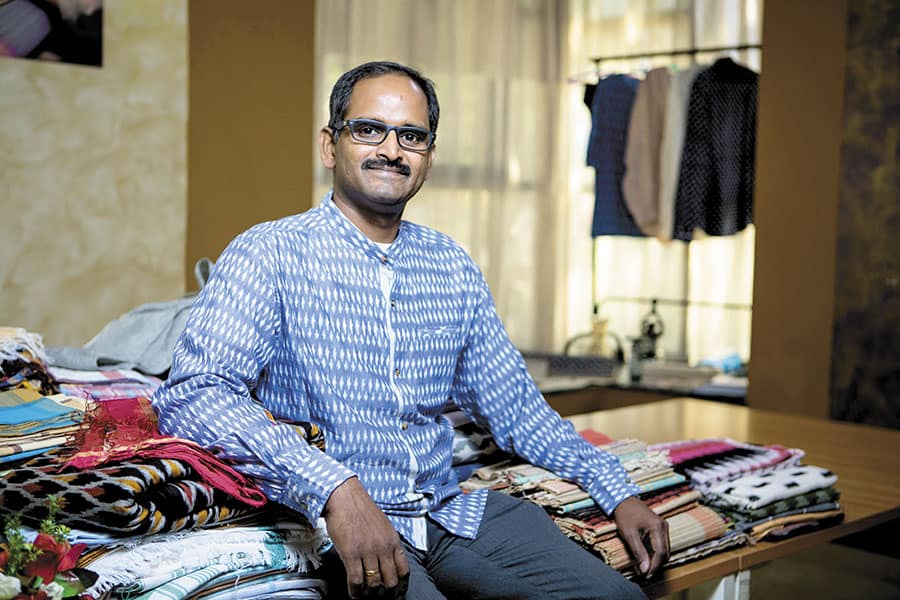
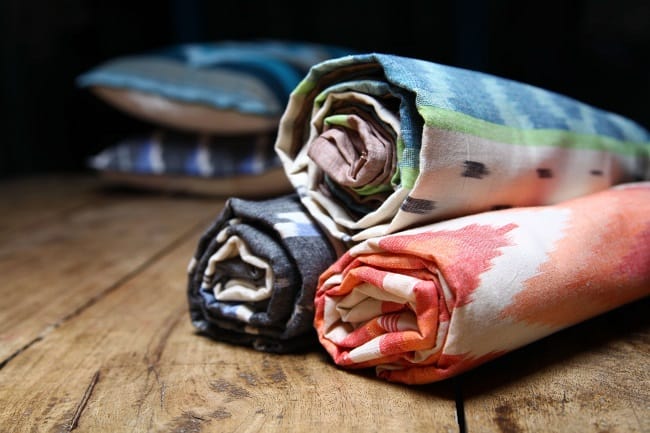
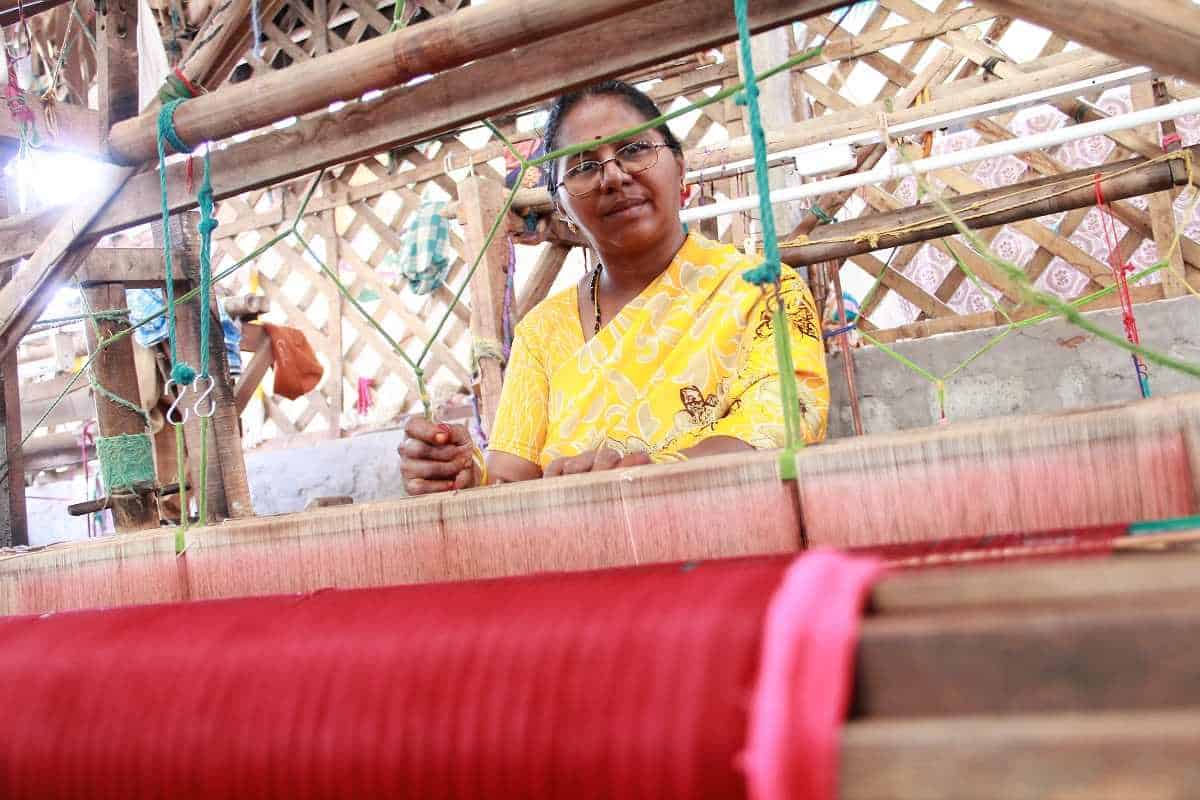
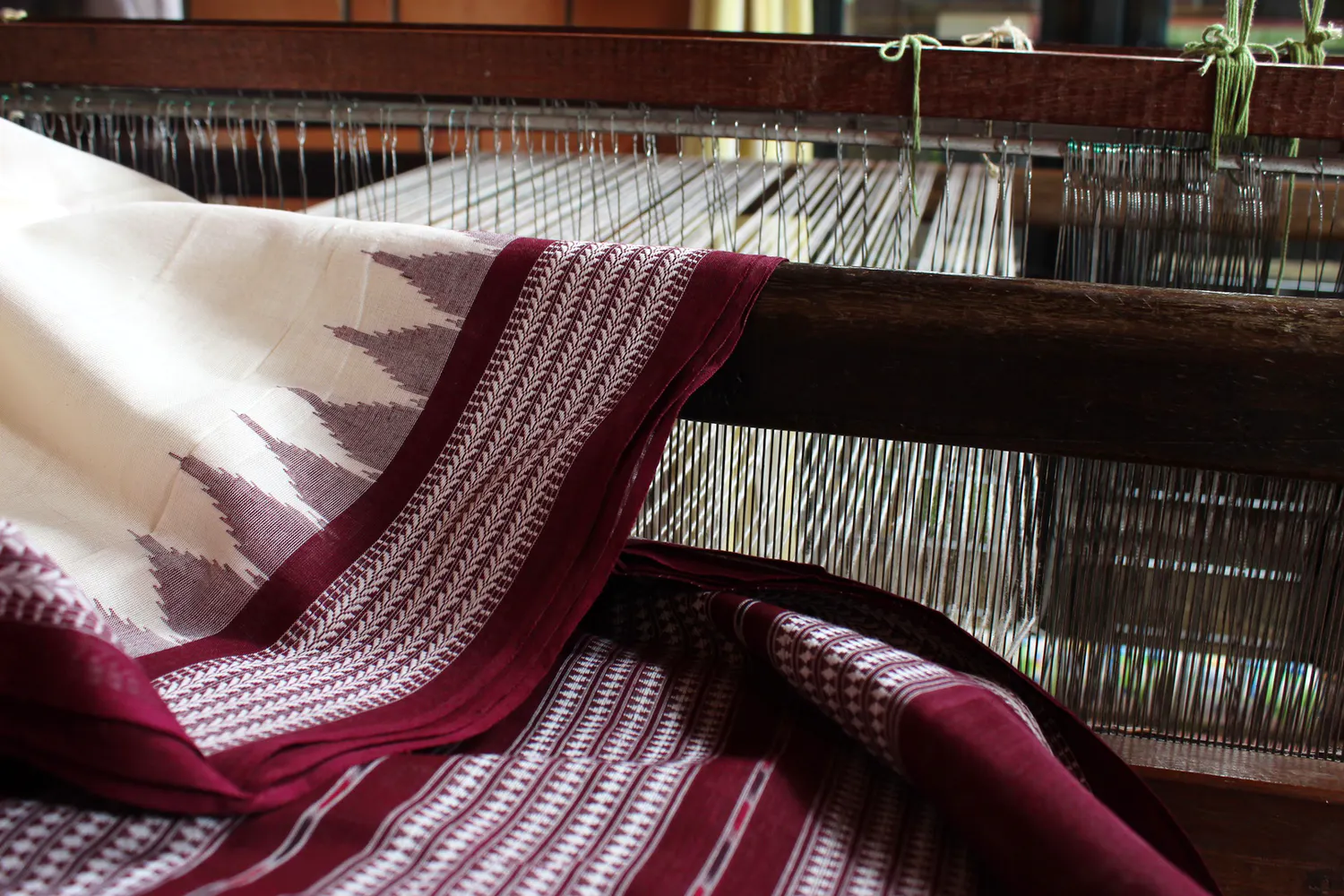
FAIRKONNECT
Fairkonnect is a Fair Trade-certified social enterprise situated in Bangalore. Their ambition is to bridge the world of Fair Trade with the ones of local artisans from all over India. Hereby the rely purely on socially and ecologically sustainable fabrics, woven by hand and produced out of 100% natural fibres. We met the founders Rema Sivaram and Pradeep Krishnappa during the “International Fair-Trade Summit 2022” in Berlin and are ever since amazed by their know-how and philosophy.

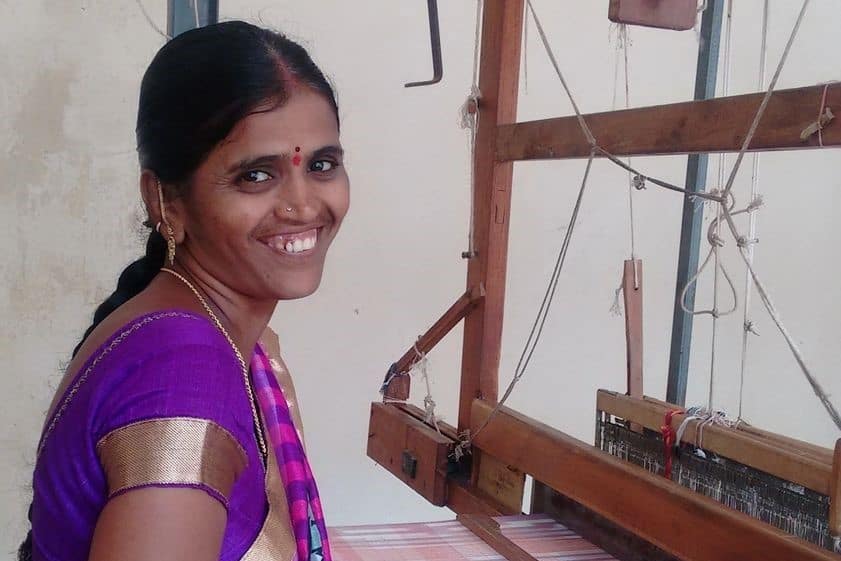
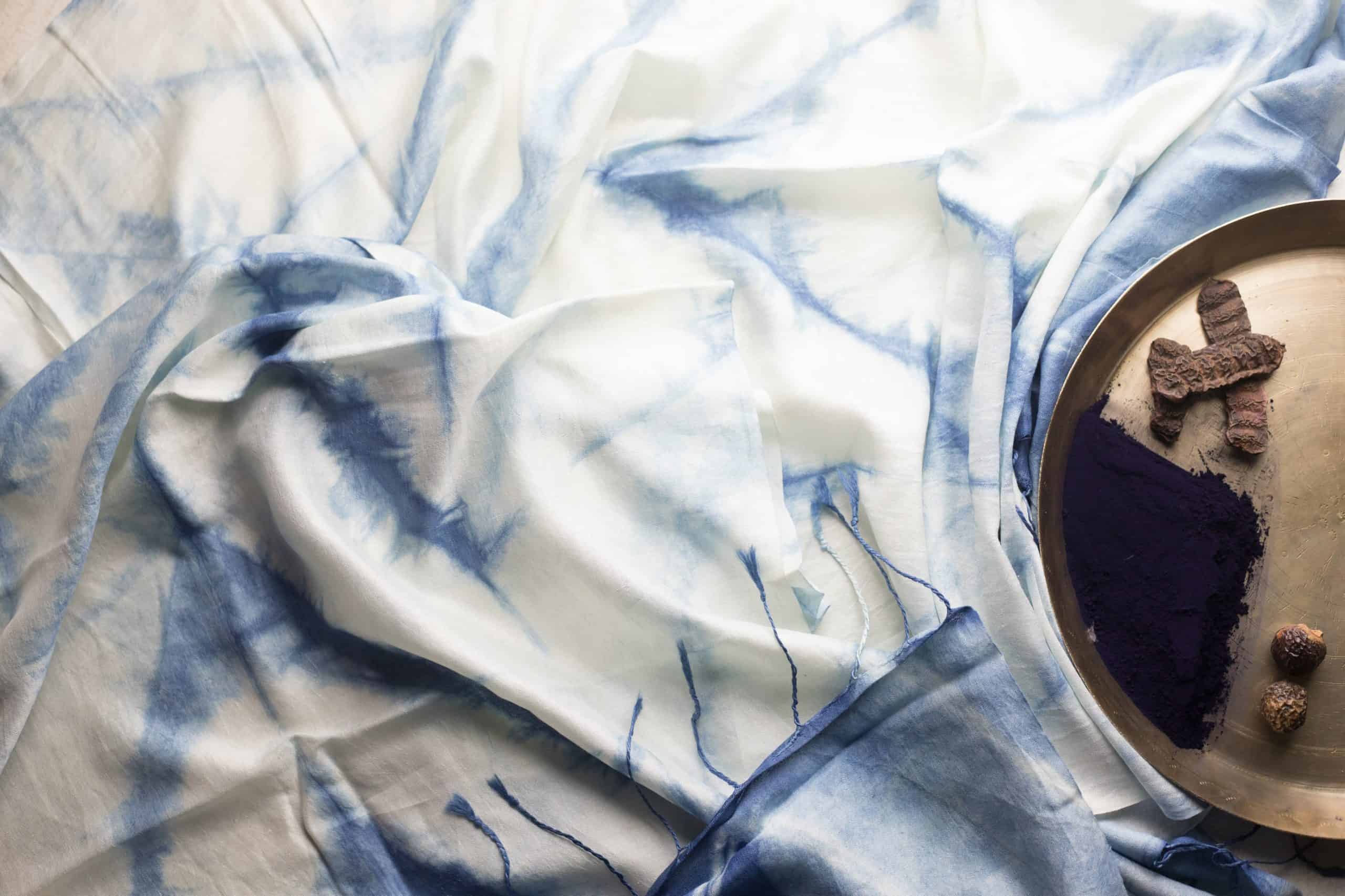
From cotton to yarn │ From yarn to cloth │ From cloth to clothes │ From Chittapur to Berlin
Handcarft in the
textile workshops
From cloth
to clothes
In our two sewing workshops in the South Indian towns Chittapur and Londa (both located in Karnataka) sixteen seamstresses cut fabrics, embroider them manually and, with great care, put them together into our finished products.
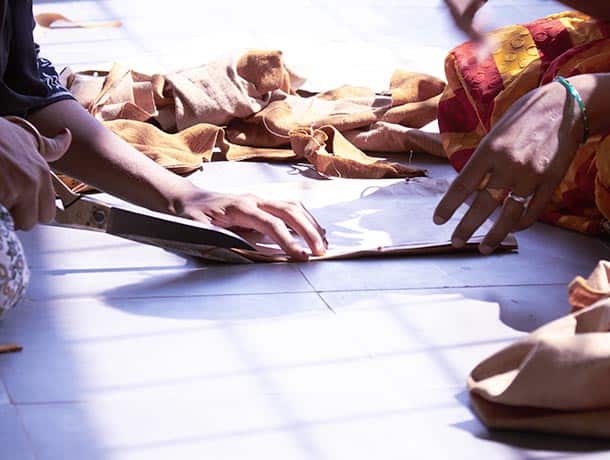
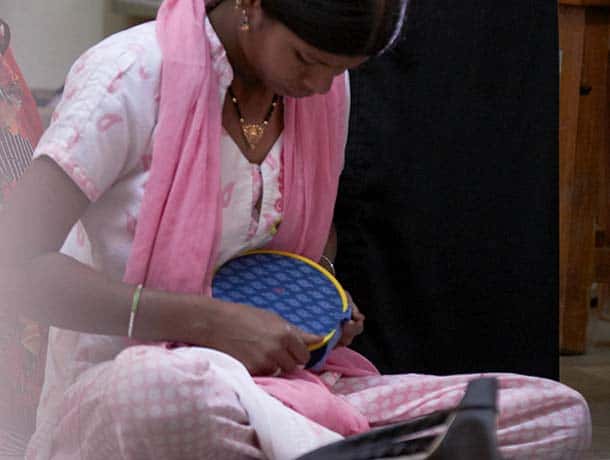
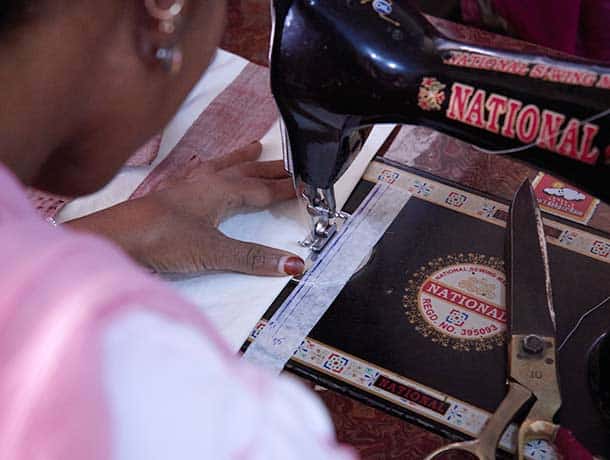
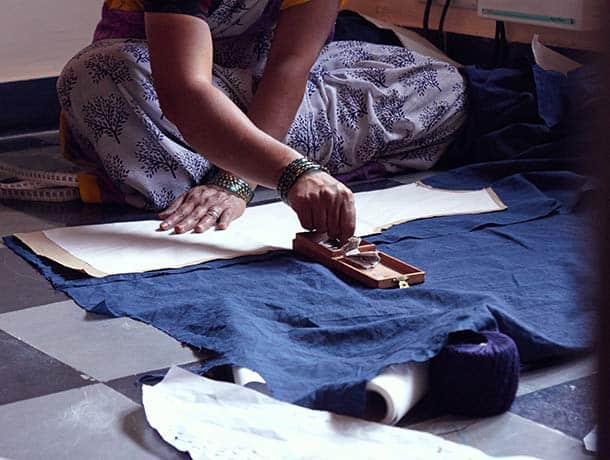
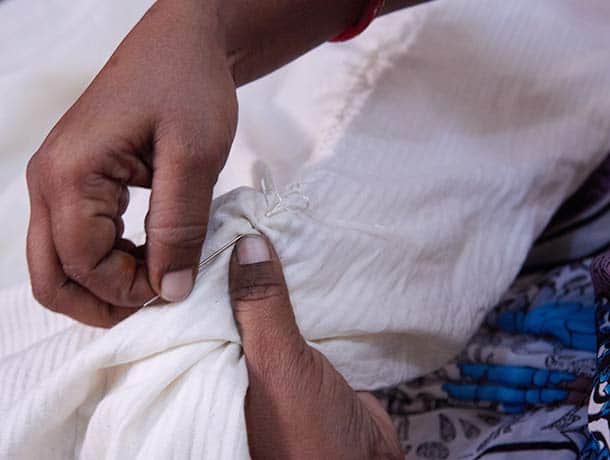
At least once a year we travel to India to introduce new sewing patterns. The women then form small teams of experts who learn the new patterns with great curiosity, in order to pass that knowledge on to their colleagues later. The rest of the year, the Indian team works independently. In consultation with us, they take care of follow-up orders of cloths and the shipping to Germany.
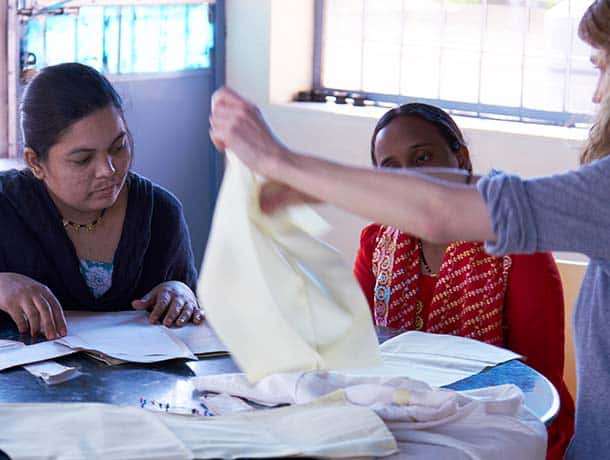

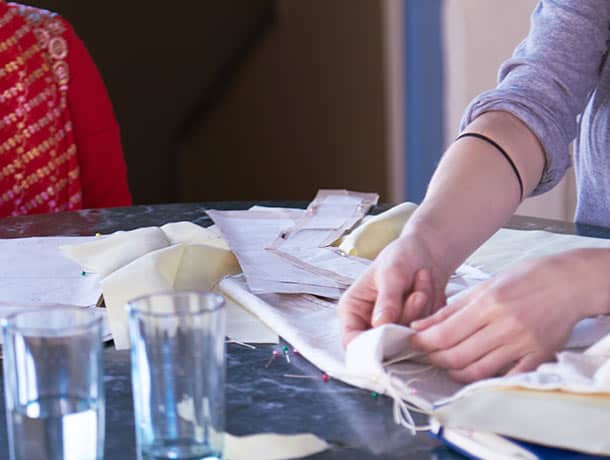
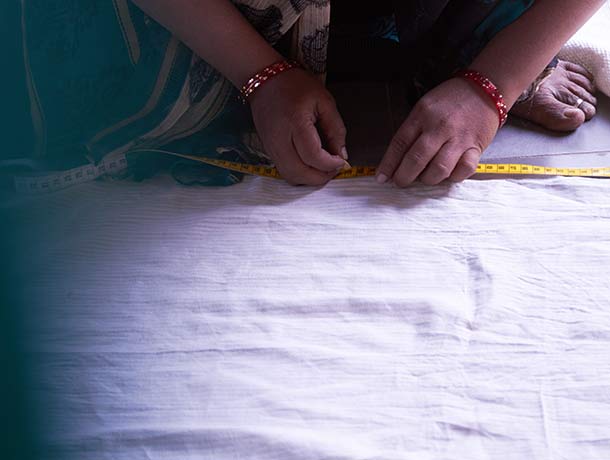
Working hours are set according to the women’s family duties: The working day starts at 10 am, after they have dropped off their children at schools, and ends at 5 pm, so that they can pick them up. In regular intervals, health-checks, seminars on women’s and labour rights, and English language courses are provided. Moreover, we give our seamstresses the opportunity to take out interest-free and subsidised (25%) loans for health or education issues. This year, four women have already taken out loans to replace their old, very health hazardous woodstoves with new gas cookers. They set the repayment schedule themselves, so they will not get into financial troubles.
From cotton to yarn │ From yarn to cloth │ From cloth to clothes │ From Chittapur to Berlin
Our clothes on
a journey to you
From Chittapur
to Berlin
Made and packed in India and then shipped to Germany, our team in Berlin is always excited to receive the parcels (apart from having to wait for hours at customs). Our team members at Okerstrasse keep Jyoti alive with their good spirits, enthusiasm and conviction. In a small co-working space in Neukölln, our homepage is looked after, our orders are carefully wrapped and packed, and ideas for new clothes come into being. Mostly though, we are working here day by day to come closer to our goal of a more just textile industry. Step by step.



